#I Love Attending A Major American Public University
Text
my university having the dracula daily guy as a guest speaker is so funny
52K notes
·
View notes
Text
'Years before he became known as the father of the atomic bomb, J. Robert Oppenheimer worked as a physics professor at the University of California, Berkeley, when he met who became perhaps the greatest love of his life.
Her name was Jean Tatlock, and just as she captured the famed physicist’s heart, their romance has captured the imaginations of historians for nearly a century. And they aren’t the only ones. Tatlock will be portrayed by Florence Pugh, alongside Cillian Murphy’s Oppenheimer, in the upcoming film Oppenheimer, directed by Christopher Nolan.
Affiliated with the Communist Party, Tatlock is often credited with introducing Oppenheimer to radical politics, something that haunted him in his later life and career. Despite their 10-year age gap, and though they were separated by the time he led the famous Manhattan Project, Tatlock had an undeniable impact on Oppenheimer’s life, and her tragic death weighed on him as he began his work on the atomic bomb.
“A free-spirited woman with a hungry, poetic mind, she was always the one person in the room, whatever the circumstances, who remained unforgettable,” according to American Prometheus: The Triumph and Tragedy of J. Robert Oppenheimer by Kai Bird and Martin Sherwin.
Meeting Oppenheimer
Born in Ann Arbor, Michigan in 1914, Tatlock was the second child of J.S.P. Tatlock and Marjorie Fenton. Her father, who had a docorate from Harvard University, was an acclaimed English professor and literary scholar and was considered a foremost expert on the works of Geoffrey Chaucer, according to Brotherhood of the Bomb by Gregg Herken.
Jean inherited her father’s intellect. Before attending Vassar College in 1931, she took a year off to travel in Europe, staying with a friend in Switzerland who was a devoted follower of psychologist Carl Jung. After meeting a close-knit community of psychoanalysts during the trip, she decided to study psychology herself, according to Bird and Sherwin.
After graduating from Vassar in 1935, she studied at the Stanford Medical School, where her intellect and good looks intimidated the other classmates. They also caught the interest of Oppenheimer, then a physics professor at the University of California, Berkeley, where Tatlock completed her prerequisites before enrolling at Stanford.
Oppenheimer and Tatlock began a passionate and intense romance in 1936, when she was 22 and he was 32. The decade age gap didn’t seem to matter. A friend described Tatlock as Oppenheimer’s “truest love” and said he was “devoted to her,” according to Bird and Sherwin. He reportedly proposed to Tatlock twice, though she turned him down.
Tatlock was impressed with Oppenheimer’s knowledge of English literature, and she introduced him to the poetry of John Donne. It’s widely believed the Trinity test—the first detonation of the nuclear weapon in 1945—was named after a Donne poem and inspired by Tatlock, according to The First Atomic Bomb by Janet Farrell Brodie.
Communist Affiliations
Tatlock was a dues-paying member of the Communist Party of the United States of America while dating Oppenheimer, an association that would later bring a great deal of scrutiny to the famed physicist. Tatlock wrote for the Western Worker, a major West Coast communist publication, and she introduced him to several prominent members of the party, according to Robert Oppenheimer: A Life Inside the Center by Ray Monk.
“I find I am a complete Red when anything at all,” Tatlock wrote to a friend, according to American Prometheus. She also pushed Oppenheimer to move from mere theory to action, and when he commented that he would have to settle for staying on the periphery of political struggles, Tatlock remarked, “Oh, for God’s sake, don’t settle for anything.”
However, Oppenheimer denied that Tatlock was solely responsible for his political interests or affiliations, noting that he first read about Soviet communism after his father lent him a book on the subject before he met Tatlock. According to Bird and Sherwin’s American Prometheus, Oppenheimer described Tatlock’s communist involvement as “on-again, off-again affairs and never seemed to provide for her what she was seeking. I do not believe that her interests were really political.”
From 1939 onward, Oppenheimer claimed he only saw Tatlock on rare occasions, and in 1940, he wed Katherine Puening, more commonly known as Kitty Oppenheimer, to whom he was married the rest of his life. However, he and Tatlock remained “the closest of friends and occasional lovers,” according to Bird and Sherwin, and she would phone him for comfort during her occasional bouts of depression.
By 1943, Tatlock was a pediatric psychiatrist at Mount Zion Hospital in San Francisco, at the start of what seemed to be a promising career. The 29-year-old was also being treated for clinical depression, which might have worsened when Oppenheimer drastically reduced contact with her after becoming director of the Los Alamos Laboratory that year, according to Bird and Sherwin.
A Tragic Death
Tatlock was placed under surveillance by the FBI due to her relationship with Oppenheimer and past involvement with communist politics. When Tatlock and Oppenheimer had one last meeting in June 1943, she confessed that she still loved him and wanted to be with him. Unbeknownst to her, FBI agents monitored the entire visit, according to Monk’s biography.
“For reasons of love and compassion, he had become a key member of Jean’s psychological support structure—and then he had vanished, mysteriously,” Bird and Sherwin wrote in American Prometheus. “In Jean’s eyes, it may have seemed as if ambition had trumped love.”
Tatlock died by suicide on January 4, 1944, at age 29. Her father discovered her body after entering her San Francisco apartment through a window after she didn’t respond to the doorbell. He found her lying in the bathroom, her head submerged in a partially-filled bathtub, with a suicide note on the dining room table, according to Monk.
“I am disgusted with everything,” the note read, according to Bird and Sherwin. “To those who loved me and helped me, all love and courage. I wanted to live and to give and I got paralyzed somehow. I tried like hell to understand and couldn’t.”
One of the first people to learn of her death was FBI Director J. Edgar Hoover, due to the agency’s surveillance, according to Monk. Oppenheimer was despondent upon hearing the news. Due to the unusual circumstances around her death and the FBI surveillance, many have speculated that Tatlock was murdered, but most of her loved ones believe the cause of death was suicide.
Tatlock’s relationship with Oppenheimer would be used as evidence against him in 1954, when the United States Atomic Energy Commission held security hearings that explored his communist associations and other past actions. Oppenheimer lost his security clearance as a result of the hearing, effectively ending his formal relationship with the U.S. government.'
#Oppenheimer#Cillian Murphy#Christopher Nolan#Florence Pugh#Jean Tatlock#University of California#American Prometheus: The Triumph and Tragedy of J. Robert Oppenheimer#Kai Bird#Martin J. Sherwin#John Donne
24 notes
·
View notes
Note
This is a silly question, but how do you think GSR approach their (hypothetical) childrens' education? My friends and I used to joke that the fact that Sara doesn't drop that she went to Harvard multiple times per episode means that she didn't fully drink the koolaid!
hi, anon!
so speaking very broadly, i think education is something grissom and sara consider important.
after all, they both value knowledge and its pursuit very highly and are both themselves educated, with multiple degrees between them.
that so, i believe they would most likely encourage any hypothetical child or children of theirs to take learning seriously and (with few exceptions) pursue higher education.
that said, i think a lot of the particulars on how they’d educate their kid(s) would probably be dependent on situational variables.
—which means i ultimately have more questions than answers in regards to this topic.
if you're willing to hang with me for a good, ol' fashioned ramble, i've got one after the "keeping reading," if you're interested.
__
to start off, just the “when and where?” of it all probably would make a big difference in grissom and sara’s choices.
for example, if they have and/or adopt said hypothetical kid(s) while they’re living in vegas and both still working at the crime lab, then they’d have to choose between sending said kid(s) to public school or private school or homeschooling them.
honestly, the las vegas public school system is one of the worst in the nation and has been for a very long time (stretching all the way back to when grissom and sara might have hypothetically first been welcoming their kid[s] into their family, circa 2005 or 2006).
knowing how bad the public schools are in sin city, they might opt not to send their kid(s) there. however, if they’re both still working the night shift at the lab, homeschooling likely wouldn’t be on the table as a choice for them (just given their hours), meaning they’d probably have to find a private school. but the vast majority of private schools in the us are religiously-affiliated, and they’re not religious. so just looking at secular private schools or charters, their options would fairly limited (particularly in the early 2000s, before the “alternative school” boom).
maybe they might choose a more stem-focused charter school. however, they also both love and value the humanities, so they also might not want to bar their kid(s) from getting a more rounded/liberal education, especially early in their development.
could they afford a pricey private institution, like the fictional butterfield academy where catherine eventually sends lindsey (see episode 05x19 “4 x 4”)?
catherine can only really afford that tuition with help from her casino mogul father, and grissom and sara aren’t in sam braun’s same income tax bracket by any means, so if they couldn’t find a school they ultimately liked and/or could afford, what would they do? would they go as far as to move—perhaps even out of state—in order to obtain better educational opportunities for their kid(s)? go a more nontraditional route, like enrolling their kid(s) in online coursework or hiring a private tutor?
of course, their whole situation and set of choices might be very different if their kid(s) were born and/or adopted and reached school-age while they were living abroad in costa rica or paris.
would they, living as expats, choose to enroll their kid(s) in their nation of residence’s school system—so, for example, in france, the école élémentaire—and have them educated in the local language, or would they seek out an international school where the kid(s) would be taught primarily in english and on a more “americanized” system?
once the kid(s) were older, would they encourage them to take ib courses? have them apply for college in the country where they’d been raised/educated or return “home” to the states to attend an american university?, etc.
if they became parents during the “sara lives in vegas while grissom lives abroad” period of canonical s10-s13, how might they go about things then?
i'm fairly certain the second they realized sara was pregnant and/or had the inclination to adopt, they’d pretty much immediately quit the whole “living on separate continents” bullshit and choose to settle all in one place as a family.
but what place—in the states or abroad?
might the educational options of both nations play a role in where they ultimately decided to live?
for example, france has one of the best education systems in the world.
and in the odd event that they had an “oops” kid or kids while they were living aboard the ishmael—a scenario i consider somewhat unlikely, just given sara’s age by that point—what might they do then?
in all honesty, i can’t really see them deciding to keep their kid(s) full-time on the boat because they’re not assholes like this girl’s parents were just due to the sheer difficulty of trying to educate a child or children while living a nomadic lifestyle on the open ocean. i think the second their child(ren) reached school-age, they’d realize their year-round seafaring days were over, at least for the time being, and would choose to settle down somewhere on land, perhaps only spending summers on the boat (treating it like a floating science summer camp for their kid[s], a la the voyage of the mimi).
but who knows?
maybe i'm wrong and they’d just choose to homeschool their kid(s) while continuing to sail and conduct their research.
after all, they are both—as polymath geniuses with multiple graduate degrees between them—qualified to teach.
of course, even outside of the issue of where they'd be living at the time when their kid(s) began school, there are other factors which might influence their decisions.
one factor that might affect their decision-making would be the number of children they ultimately had and what the spacing between the kids were like if they had more than one.
for example, it's easier to homeschool two kids who are close in age than it is to homeschool two kids who are close in age and then the "oops" baby of the family who is eight years younger than everybody else; it's more feasible to pay for one kid to attend a pricey private school than to pay for two kids to do so; though moving to a new state for the sake of better public schools might not be something you'd consider with just one kid, doing so when you have four kids (and you can't afford private school for all of them) could be an imperative; if one of your kids requires special ed. services that aren't offered in your public school district of residence, you might choose to send all of your kids to a charter school where such services are available, just to keep them all together; etc.
another—related—factor would be finances.
obviously, kids cost money, and the more kids you have, the more money they cost.
even just having one kid can be spendy.
that so, not only might their financial situation affect what kinds of schooling they chose for their kid(s) when they were young, but it might also come to bear when their kid(s) reached college-age.
depending on when said kid(s) were born and/or adopted, they might end up graduating high school either circa or after the point when grissom was retired, at which time their family might be down to sara’s single income, supplemented by grissom’s savings/social security payments.
while i have no doubt but that grissom and sara would likely have opened a college fund for their kid(s) the moment they realized sara was pregnant and/or they started considering adoption, given that college costs have risen exponentially over the course of the last two decades and are still continuing to rise, they still might not be able to fully foot that bill, particularly if they ended up having multiple kids and/or their kid(s) intended to attend pricier schools (like, say, harvard).
it's worth noting: we don’t know almost anything about grissom and sara’s financial situation in show canon. my impression is that while they’re both still living in vegas and even when they’re doing the “split-living situation” thing between s10 and s13, by early to mid-2000s standards, they’re more or less middle-class (perhaps on the upper end of that tier, considering they are, in canon, dinks); however, it’s harder to gauge where they’re at during their ishmael days. are they living on grant money? savings? investments? inheritance from betty? do they have any kind of regular income?
of course, if the kid(s) took after mom and dad, they might earn full-ride scholarships to any university of their choosing.
but that’s another thing:
even though there is a fairly good likelihood that, given grissom and sara’s genes, any biological kid(s) of theirs would be “academically inclined,” perhaps even to the genius level, we can’t necessarily assume that such would be the case.
for one thing, if the kid(s) were adopted, they might have different educational aptitudes than grissom and sara.
for another, even if the kid(s) were biological, they still might not necessarily inherit grissom and sara’s bookishness.
in either case, there might be learning disabilities involved or possible mental health issues.
that so, it’s not just a matter of course that any kid(s) grissom and sara were to have would earn scholarships to college, full-ride or otherwise; grissom and sara might end up having to pay out of pocket for their kid(s) to pursue a higher education.
their kid(s) also might not ultimately pursue higher education at all, either due to disinterest or due to academic ineligibility.
honestly, it would be really interesting to see how grissom and sara would respond to having a kid or kids who weren’t as academically inclined as they are.
how might they deal with a report card filled with c+ and b- (or even lower) grades? with a child who hated to read or had trouble with math? with a soon-to-be-high-school graduate whose gpa qualified them for community college only? with a son or a daughter who came to them and said, “mom, dad, i don’t think i want to go to attend any kind of university at all”?
while i have supreme trust in their ability to love the kid(s) they have as they are and to eventually adjust their expectations and support their kid(s) down whatever life path they ultimately ended up following, i also think it might initially be difficult for them to wrap their heads around having a kid or kids who just weren’t as schoolish as they are.
learning and education are so important to them and are central to their identities; they might find it difficult to even conceptualize what kind of life their child(ren) would have taking an alternative route.
in any case, if they had a kid or kids who didn’t qualify for scholarships but still planned to attend college, it might pose their family some financial difficulty, especially if grissom were already retired by that point.
unless we assume they had an accidental love baby during the san francisco days (between 1998 and 2000)—again, a scenario i consider to be fairly unlikely—then most probably any children they had biologically and/or adopted would be born and/or join their household between 2005 at the earliest and around 2020 at the latest, meaning they would reach college-age sometime between 2023 and 2038. meanwhile, grissom would reach retirement age circa 2023.
of course, just like it may be true that grissom and sara’s children might not follow in their academic footsteps, it also could be the case that, conversely, they would follow in them.
both grissom and sara graduated high school early—grissom at age fifteen, sara at age sixteen—and attended university while still minors.
it's possible their kids could do the same, in which case our timeline might move up a bit.
in the event their kid(s) were admitted early to university, then a scholarship of some kind would most likely be on the table.
it might therefore be possible for them to not only send multiple kids to college—if they had them—but to also send them to really good schools.
so how would they approach the issue of school choice?
sara attended harvard for her undergrad and uc berkeley for her master’s degree (and possibly an unfinished phd). meanwhile, grissom—most likely—attended ucla for undergrad and uc davis for his phd.
by the way, i know this post isn’t really the place for it, but i want to mention: back in the day, fans commonly used to believe that grissom had attended the university of chicago for his phd, citing what seemed to be a diploma on his office wall from that institution as proof. however, upon close inspection of the document, one can see that it is an honorary certificate from the society of vector ecology, a real-life professional organization for persons who study “nuisance organisms and disease vectors” (including insects), and is not actually a degree of any kind.
perhaps somewhat unrealistically, neither one of them ever talks much about their educational backgrounds on the show, so we really don’t really have a feel for how they regard their respective alma maters. do they have any school spirit or (as you suspect, in sara’s case) are they perhaps more lukewarm concerning those particular ties?
without knowing, we can only conjecture: would they insist that their kid(s) “follow in their footsteps” and attend the same schools where they are themselves alumni? if so, which school(s) would they insist upon? would mom or dad’s affiliations win out?
it is worth noting being a “legacy student” does often help with admissions, particularly at ivy league schools. for example, every year, about 30% of harvard admits are legacy students.
alternatively, would they be open to their kid(s) attending schools they hadn’t attended themselves or perhaps even encourage them to do so? if so, would they have any expectations regarding what types of schools were on the table—for example, “you have to pick an ivy league university” or “no state schools” or “anywhere but yale”?
what if, by this time, grissom had retired from criminalistics and had taken a teaching job somewhere?
in canon, grissom teaches at both williams college in massachusetts and the sorbonne in france.
what if he were on faculty at one of those schools when his and sara’s kid(s) came of college-age or else was teaching at some other university then?
tenured faculty members often receive discounted or even free tuition for their children at the institutions where they teach.
were they afforded such a benefit, would grissom and sara make their kid(s) attend the same school where grissom were teaching, just as a matter of cutting educational costs?
what about a school where uncle greg were located (as it is suggested in the reboot that he is pursuing a phd in chicago with the intention to someday become a professor)?
if their kid(s) did qualify for scholarships—meaning cost were not an issue—might location factor into the decision-making process?
as an undergrad, sara attended a school literally on the other side of the country from where she’d grown up (probably at least somewhat by design).
however, grissom stuck relatively close to home.
if he indeed matriculated at ucla, then he went to school about 12 miles away from his hometown of marina del rey.
would grissom and sara give their kid(s) free rein to attend school anywhere in the country or perhaps even internationally, or would they want them to stick closer to home (wherever "home" happened to be)?
what about the issue of picking majors once their kid(s) were enrolled?
again, though one might easily assume that any biological child of grissom and sara’s would likely be science-minded like them, they might end up having a kid or kids (either adopted or biological) who were more into the humanities.
would they be cool with their child(ren) declaring a photography major or ending up with an mfa in art history? they both themselves enjoy the arts and culture and are very literary. however, the “family business” is science. so would they try to shepherd their kid(s) in that direction? or would they give them the choice to follow whatever their own academic bliss were?
anyway, all of the above rambling is to say that i don’t think there is necessarily a “one-size fits all” answer to your question.
the way grissom and sara approached how they educated their kid(s) would likely depend on myriad factors; they might choose to go in one direction in scenario a and to go in another direction in scenario b, you know?
like i said up top, i do think their instinct would always be to encourage their kid(s) to seek as much education as possible.
both grissom and sara are excellent teachers and constantly ply each other with trivia and fun facts. their “family culture” even as a childless couple in canon is one that is built around the pursuit and exchange of knowledge. even just the way their condo is set up in s8 shows their extensive curiosity for the world.
that so, i imagine theirs would be a household where they would constantly be reading to their kid(s) and having their kid(s) read back to them once they were old enough, where they’d have science experiments spread out across the countertops and art projects displayed proudly on the fridge, where weekend outings would frequently be to museums and historical sites and national parks, where they’d max out on the library book check-out limit each week, where there’d be art supplies and modeling kits and alphabet blocks and magnetic numbers strewn across the playroom floor, where solving riddles would be a favored dinnertime activity, where stumping dad with a “did you know—?” question or beating mom on a mental math problem would be a badge of honor, where inventing a secret cypher for writing notes or solving a massive jigsaw puzzle would frequently be the pursuit of an afternoon, etc., etc., etc.
grissom and sara would probably be very involved with their kid’s or kids’ k-12 schooling, helping them out with homework and science fair projects, going in for parent-teacher meetings, attending extracurricular activities, and just generally being incredibly “hands on” regarding their academic progress.
if there were a class or subject area their kid(s) struggled with, they would probably try tutoring (either with themselves acting as the tutors or else someone they hired).
they would probably also very much encourage independent learning, outside of the school curriculum.
they would likely assume, unless something forced them to consider otherwise, that a college education for their child(ren) were an eventuality—not an "if" but rather a "when."
if it turned out that their kid(s) were not interested or able to pursue higher education, they’d have to shift that paradigm.
and in a such a case, i suspect they’d very much want their kid[s] to develop some kind of skill or learn a trade, if possible.
however, otherwise, i think they’d do everything in their power to give their kid(s) an opportunity to pursue higher education.
in scenarios where their kid(s) were interested in and qualified for higher education, grissom and sara would probably want them to attend the best universities open to them. however, i think they could also be prevailed upon to accept their kid(s) going to less prestigious institutions if it turned out that said institutions somehow suited them better (particularly since i believe that while sara enjoyed harvard immensely academically, she also likely struggled there socially, so she probably understands that a top school doesn’t necessary equal best fit).
if their kid(s) wanted to go to a school that were closer to home, say, or one where they felt a better cultural fit—even if it weren’t on the forbes top 25 list—they would likely be supportive.
they might likewise consider having their kid(s) attend a school where grissom were teaching, particularly if doing so represented the best financial option for their family.
they would also likely be thrilled if their kid(s) eventually went on to graduate school, though i don’t think they’d expect or require them to.
honestly, for as science-minded as they both are, i think they’d be supremely chill about their kid(s) studying subjects other than science. while of course they’d be overjoyed to have another scientist in the family, i think they could be equally as excited about their kid(s) pursuing a degree in history or art or a language.
considering betty’s background as an art dealer, it might make grandma very happy if her grandkid ended up pursuing an art degree, too.
i believe they also could be supportive of their kid(s) going in an entirely different direction like engineering or computer science or veterinary medicine or physical therapy or what have you.
i suspect grissom and sara would do as much as they could to support their kid’s or kids’ education financially.
like i said, i think the second they got back a positive pregnancy test or were approved for an adoption, they’d start putting money away into a college fund.
if their kid(s) went on to secure scholarships, then that money could end up as a gift and/or nest egg.
however, depending on circumstances, the money might not be enough to cover an entire college education (and particularly not if they had multiple kids), in which case, either they or their kid(s) might have to take out some loans.
honestly, i think they’d try as much as possible to avoid having their kid(s) take on too much student loan debt themselves (and especially since sara likely knows from experience what it is like to be in that situation, having no financial support from parents).
grissom might end up working past retirement age in order to avoid that outcome.
regardless of where their kid(s) attended school, i have no doubt but grissom and sara would be proud af of them when they graduated—even if it were ultimately from a trade program or a two-year school.
ultimately, i think the main thing they’d want for their kid(s) even beyond any particular degree or educational accolades would just be for them to always want to keep learning, no matter the field or format, you know?
of course, i have some pretty specific plans for grissom and sara’s educational choices as parents in the accidentsverse, but those count as #spoilers, so.
anyway.
enough broad rambling from me!
thanks for question! please feel welcome to send another any time.
4 notes
·
View notes
Note
I love that we discovered so much about Anna in this new chapter. Finding out that Anna was a college student fascinated me.
As I have read women in Europe began actively attending college even earlier than women in the United States.
By World War II it was already very common for women throughout Europe (at least for the most part) to attend universities composed of both men and women. In the United States, on the other hand, although there were women-only universities, there were still very few women attending.
I think it is right that Rooster is not surprised to discover that Anna was a university student and part of the resistance. Because for during WWII the U.S. Navy created the WAVES branch for college women to enter the Navy at officer rank and serve during the war. So I guess Bradley has already met several of those women.
Even in England there were all-female aviation squadrons during WWII.
I found it so sweet and yet so sad how Anna felt the need to explain to Rooster why she was so nervous at that moment during the night. It was quite melancholy how Anna wanted to let Bradley know that she used to be an ordinary girl before the war, which is true.
You are absolutely right, and just to add a little bit more context for Czechoslovakia specifically (im probably going to write too many words here so i'll put it under a keep reading)
The interwar years, or the First Republic, are broadly considered a time of progress: socially, economically and militarily. In particular, it saw almost all institutions open to women/become co-ed and which resulted in (a relative) surge of in women becoming practicing professionals as medical doctors and lawyers, professors, but also in a number of technical fields and entering the workforce in different vocations. This is in part through the influence of the first First Lady of Czechoslovakia, Charlotte Garrigue Masaryk, who herself was well-educated (and American-born) and was quite clearly a heavy influence on her husband when it came to matters of education equality (even before he became president in 1918).
(not to leave out the efforts of other female Bohemian writers, thinkers and activists that were also active and successful during Austro-Hungarian times, but that's another topic)
That said, Anna would have still been part of a minority as a female student, even though a generation of graduates and professionals already preceded her and established a place in society. But the opportunities presented to her, academically and professionally, would be like night a day almost compared to pre-WWI—when girls for example could only take final exams at private schools, when boys could go to public school (and that after almost 200 years of compulsory 8 years of primary education for boys and girls >.> ). Austria-Hungary was actually relatively slow in establishing equal rights to education compared to many western countries, and real change only came about after the break-up of the empire. Anyway, I think that she is conscious of that, and that it's of definite influence on how she acts and perceives the world around her and her place in it.
And I agree on that Rooster would, again in the grand scheme of things, not be that surprised. Definitely through his experiences and what he must have seen in the U.S, and the U.K. of women not only entering the armed forces but also the workforce at large as you pointed out. But at that time at the eastern front, women saw active combat as snipers, in artillery and tank divisions (although, it should be noted that the majority of women in the armed forces there, too, usually served in medical units). And moreover, generally, all through Europe, women played pivotal roles in national resistance movements.
One particular example that always comes to mind is Hannie Schaft, of the best known resistance fighters in the Netherlands, who was executed by Dutch Nazis at only 24 in 1945. (and probably apocryphal, but after the first bullet only grazed her, she told her executioner "I shoot better!" — tbh i want that to be true so badly).
Okay, if you actually made it through that whole word vomit above haha, thanks 🧡 and thanks for reading the story, your comments make me super happy!
#pisu answers#just to add#the interbellum period is not actually my specialty#neither is social history#but thanks for coming to my unhinged ted talk!
4 notes
·
View notes
Text
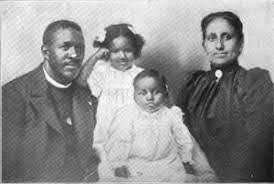
The date of birth for Julia Ringwood Coston, one of the first black women to edit a magazine, is unknown. We do know that she was named after Ringwood farm in Warrenton, Virginia, where she was born. While she was still an infant, Ringwood moved to Washington D.C. with her family and attended public schools there. She had almost completed school when her mother died and she was forced to withdraw.
In the spring of 1886, Ringwood married William Hilary Coston, a student at Yale University who eventually became a minister and writer. They had two children, a daughter, Julia R. in 1888, and a son, W.H. in 1890. The family settled in Cleveland, Ohio where William Coston was pastor of Saint Andrew’s Episcopal Church. William Coston was especially encouraging of Julia’s writing interests and gave her advice based on his experience as a writer.
In 1891, Julia Coston, realizing that white journals ignored black interests and themes, decided to create her own journal: Ringwood’s Afro-American Journal of Fashion. Concerned with the suffering and hopelessness of black women in the South, she believed that press editorials could be effective in protesting their inhumane treatment. The twelve-page journal, which had a yearly subscription fee of $1.25, provided advice on homemaking, etiquette, and fashion.
Ringwood’s Afro-American Journal of Fashion carried illustrations of the latest Paris fashions along with articles, biographical compositions of outstanding black women and promising young ladies, instructive articles for women and their daughters, as well as love stories. At the time, it was the only fashion magazine for blacks in the world.
The journal received tremendous praise from its readers and other noted publications. In 1892, Rev. Theodore Holly, then living in Port-au-Prince, Haiti, wrote that Ringwood’s Afro-American Journal of Fashion was already the leading magazine in that nation while the Philadelphia Recorder declared the magazine a welcome addition to any home, white or black. Victoria Earle (later Matthews), a black New York society leader, wrote that the magazine was a major source for instruction and guidance in home organization.
Julia Coston strongly supported and encouraged women writers through her journal and allowed younger contributors to gain publication experience there. She also believed these writers were good role models for the journal’s target audience.
For two years, from 1893 to 1895, Coston published a second journal: Ringwood’s Home Magazine. It was not as successful as her fashion magazine though, and she eventually stopped publishing it.
Black Wall Street Book eStore
https://blackwallstreet.org/books
Support the Black Wall Street Movement
https://blackwallstreet.org/join
Top Seller: The 1619 Project
https://amzn.to/3Z5dVaj
The Victory of Greenwood
https://amzn.to/3ymULRs
Tulsa's Legacy: A Greenwood Novel
https://amzn.to/3FcnbRZ
The Burning: Massacre, Destruction, and the Tulsa Race Riot of 1921
https://amzn.to/3YFfTgH
Hidden History of Tulsa
https://amzn.to/422YPEj
Dreamland: The Burning of Black WallStreet Tulsa, Oklahoma. 1921
https://amzn.to/404tGyB
The 1921 Tulsa Race Massacre: A Photographic History
https://amzn.to/3YHztcf
From Burning to Blueprint: Rebuilding Black Wall Street After a Century of Silence
https://amzn.to/3J86ZTi
Tulsa, 1921: Reporting a Massacre
https://amzn.to/402dfm3
Tulsa's Black Wall Street: The Story of Greenwood
https://amzn.to/3yyARTY
Black Wall Street 100: An American City Grapples With Its Historical Racial Trauma
https://amzn.to/4203qqV
Black Wall Street: From Riot to Renaissance in Tulsa's Historic Greenwood District
https://amzn.to/3Lj010s
I Am Black Wall Street
https://amzn.to/3ZGxlCQ
Black Wall Street and the Tulsa Race Massacre: The Creation and Destruction of America’s Wealthiest African American Neighborhood
https://amzn.to/3Lg6lpe
The Destruction of Black Wall Street
https://amzn.to/3l08X01
Death in a Promised Land: The Tulsa Race Riot of 1921
https://amzn.to/3mMLorI
Angel of Greenwood
https://amzn.to/3LfcKku
Unspeakable: The Tulsa Race Massacre
https://amzn.to/3J4adXM
Tulsa Race Massacre of 1921: The History of Black Wall Street, and its Destruction in America's Worst and Most Controversial Racial Riot
https://amzn.to/3l7c0n2
The Nation Must Awake: My Witness to the Tulsa Race Massacre of 1921
https://amzn.to/3TcxYS3
Black Wall Street Burning
https://amzn.to/3JxqIgo
The Tulsa Massacre of 1921: The Controversial History and Legacy of America’s Worst Race Riot
https://amzn.to/3l406u9
Riot And Remembrance: The Tulsa Race Massacre and Its Legacy
https://amzn.to/3J2vy3G
Hiding The Tulsa Black Wall Street Massacre: How the Media Shapes Racial Stereotypes
https://amzn.to/3mJZkmy
4 notes
·
View notes
Photo

Kerry Marisa Washington (born January 31, 1977) is an actress, producer, and director. She gained wide public recognition for starring in Scandal. She was twice nominated for the Primetime Emmy Award for Outstanding Lead Actress in a Drama Series and once for the Golden Globe Award for Best Actress – Television Series Drama. Her portrayal of Anita Hill in Confirmation earned her a nomination for both the Primetime Emmy Award for Outstanding Lead Actress in a Miniseries or a Movie and the Golden Globe Award for Best Actress – Miniseries or Television Film. And for her role as Mia Warren in Little Fires Everywhere she was again nominated for the Primetime Emmy Award for Outstanding Lead Actress in a Miniseries or a Movie. In the film, she is known for her roles in Ray, The Last King of Scotland, Fantastic Four, and Django Unchained. She has starred in Our Song, The Dead Girl, Mother and Child, Night Catches Us, I think Love My Wife, Lakeview Terrace, She Hate Me, and American Son. Time magazine included her in its Time 100 list of most influential people. Forbes named her the eighth highest-paid television actress. She has won a Primetime Emmy Award and five NAACP Image Awards, including The President's Award. She was born in the Bronx, the daughter of Valerie, a professor and educational consultant, and Earl Washington, a real estate broker. She attended George Washington University, graduating Phi Beta Kappa with a double major in Anthropology and Sociology. She studied at Michael Howard Studios. She married NFL player Nnamdi Asomugha (2013-) and they have a daughter and a son. #africanhistory365 #africanexcellence #alphakappaalpha https://www.instagram.com/p/CoE_OWZrvrW/?igshid=NGJjMDIxMWI=
0 notes
Photo
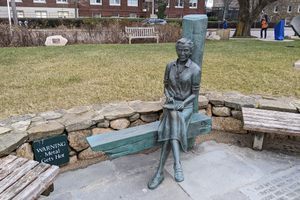
Rachel Carson Memorial in Falmouth, Massachusetts
Water is life and, in many ways, life is water. It is essential for (most) life and, in the ways it rushes, settles, whirls, and freezes, it is symbolic of life. Though we can control water through nozzles and pipes, the forms that have long intrigued humanity is found not in our sinks but in our seas. What lies beyond the horizon while you're lounging at the beach? Scientists and environmentalists who have worked to better understand marine life and the world's oceans have been immortalized for their accomplishments: Jacques-Yves Costeau, Hans Haas, Eugenie Clark, and the legendary Rachel Carson. Carson was born hundreds of miles from the nearest ocean in Springdale, Pennsylvania, in 1907. As a child, she was an avid reader and fell in love with stories of the natural world. That reading inspired her to write several short stories, and she published her first story at just 10 years old. Carson's lifelong devotion to the ocean began in the late 1920s, when she began attending the Pennsylvania College for Women (later renamed Chatham University). She originally studied English, but later changed her major to biology. After graduating in 1929, she spent a summer at the Marine Biology Laboratories at Woods Hole in Falmouth, Massachusetts. To quote Carson, "I had my first prolonged contact with the sea at Woods Hole...That wonderful place of whirlpools and eddies and swiftly racing water." That time at Woods Hole was hugely impactful for Carson. She went on to become the editor-in-chief for all publications from the U.S. Fish and Wildlife Service and led a remarkable 15-year career in the federal government studying and protecting nature. She would also publish a handful of books that cemented her as one of the country's leading experts on the ocean, such as Under the Sea-Wind (1941) and The Edge of the Sea (1955). While a government job and some award-winning books under her belt could have been the perfect excuse for Carson to kick her feet up and relax, she instead continued working to protect the natural world. It was this work that would change the world. After World War II, farmers across the United States would turn to new innovations in synthetic chemical pesticides to protect their crops. Dichlorodiphenyltrichloroethane (DDT) was the pesticide of choice. While effective from an agricultural standpoint, some were wary of this new chemical concoction's effect on the environment; none more so than Carson. She recognized that the long-term use of DDT posed an incredible threat, as DDT was becoming linked to decreasing animal populations as well as risks to human health. The idea was supported by a lot of data, but Carson faced fierce opposition from the United States Department of Agriculture. Several authors she reached out to for contributions shied away from the controversial project. Yet Carson was undeterred. In 1962, she published the book Silent Spring, which detailed the threats of DDT usage. it Became a best-seller, with fans including President John F. Kennedy and Supreme Court Justice William Douglas. Most importantly, it ignited a generation of Americans to become aware of their impact on the environment. Many credit Silent Spring as kickstarting the global environmentalism movement. Sadly, only two years after Silent Spring was published, Carson died at the tragically young age of 56 of a heart attack after a long battle with breast cancer. She lives on through the efforts of millions she influenced to care about the Earth we all share with one another. So to does she live on in her beloved Woods Hole, where a memorial sculpture by artist David Lewis was unveiled in 2013. The statue shows a smiling Carson staring off towards the ocean, and is situated right next to the Woods Hole Port, where some of the most advanced oceanographic technology in the world is stationed. A fitting tribute to a woman who made the ocean just a little bit more familiar to us all.
https://www.atlasobscura.com/places/rachel-carson-memorial
0 notes
Text
Soccer Journalist Dies at World Cup After Collapsing at Argentina Game
Grant Wahl, who in his career covered soccer for Sports Illustrated, Fox Sports and CBS, was in Qatar for his eighth men’s World Cup.
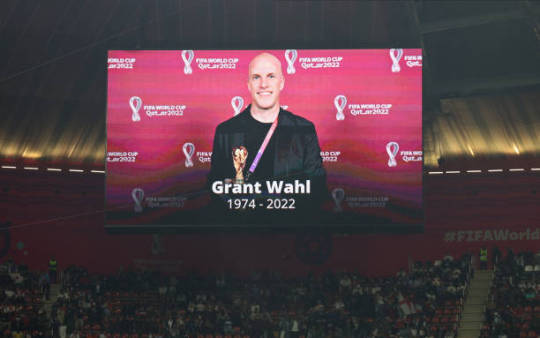
Grant Wahl, a highly regarded soccer journalist who wrote extensively on the game, died Friday in Qatar, where he was covering the World Cup quarterfinal match between Argentina and the Netherlands.
Wahl’s agent, Tim Scanlan, confirmed the death in a phone interview on Friday night. Scanlan said that Wahl had been in the press box in the closing minutes of the match when he went into acute distress.
He is believed to have died, Scanlan said, at a hospital in Qatar or while he was being taken to one, after feeling unwell as the tournament proceeded.
“He wasn’t sleeping well, and I asked him if he tried melatonin or anything like,” Scanlan said. “He said, ‘I just need to like relax for a bit.’”
According to two New York Times journalists who were present, medical personnel performed chest compressions and other treatment for about 20 minutes before Wahl was taken out of Lusail Iconic Stadium.
Wahl was in the midst of his eighth men’s World Cup, with an aggressive schedule of reporting stories and recording podcasts.
Wahl’s wife, Dr. Celine Gounder, also confirmed the death in a post on Twitter. A family friend said that Gounder asked for privacy, and would leave all public comment to the U.S. Embassy in Qatar and the United States Soccer Federation.
Ned Price, a State Department spokesman, said U.S. officials were in contact with Wahl’s family and were “engaged with senior Qatari officials to see to it that his family’s wishes are fulfilled as expeditiously as possible.”

Wahl, 48, began his professional journalism career in 1996, at Sports Illustrated, where he worked for more than 23 years. He started out covering both soccer and college basketball, and wrote the magazine’s first cover story on LeBron James, titled “The Chosen One,” in 2002, when James was a junior in high school. Wahl then transitioned to cover soccer exclusively and his career grew in prominence alongside the sport in the United States.
“Grant’s passion for soccer and commitment to elevating its profile across our sporting landscape played a major role in helping to drive interest in and respect for our beautiful game,” the United States Soccer Federation said in a statement Friday night. Don Garber, the commissioner of Major League Soccer, wrote that Wahl “was a kind and caring person whose passion for soccer and dedication to journalism were immeasurable.”
Wahl grew up in Mission, Kan., outside of Kansas City, before attending Princeton University, where he graduated in 1996. Princeton is where Wahl fell in love with soccer. As a reporter for The Daily Princetonian, he covered the team when it was coached by Bob Bradley, who later led the United States men’s national team at the 2010 World Cup.
At Sports Illustrated, Wahl wrote dozens of cover stories and introduced Americans to many of the world’s great soccer stars, like Neymar and David Beckham, not to mention American stars like Christian Pulisic and Alex Morgan, and was one of a handful of journalists who covered the sport on a full-time basis. He wrote a book about the years Beckham spent playing in Major League Soccer, called “The Beckham Experiment,” and another on how the game’s best players think, titled the “Masters of Modern Soccer.”
Wahl also did television work for Fox Sports, and more recently, CBS.
After 24 years at Sports Illustrated, Wahl’s tenure ended unceremoniously after he was fired by Sports Illustrated’s publisher, Maven, over a dispute about pandemic-related pay cuts.
But Wahl quickly struck out on his own, starting an email newsletter, Fútbol with Grant Wahl, that garnered thousands of paid subscribers, and a podcast with Meadowlark Media, a sports media company started by the ESPN veterans John Skipper and Dan Le Batard.
“He is in my view America’s pre-eminent soccer journalist. He had this space as kind of a pioneer,” said Chris Wittyngham, his podcast co-host. “He was just so nice. Midwestern charm is a cliché, but he had it in abundance.”
Wahl was writing daily articles and recording podcasts every other day from Qatar throughout the World Cup. In recent days, Wahl wrote about struggles with his health during a run of coverage that, he said, typically left room for about five hours of sleep a night.
What had seemed to be a common cold for more than a week, he wrote, had “turned into something more severe” around Dec. 3, when the United States played the Netherlands.
“I could feel my upper chest take on a new level of pressure and discomfort,” he wrote, adding that he had tested negative for the coronavirus. Medical officials in Qatar, he said, thought he had bronchitis. The antibiotics he received, he said, appeared to work, backed up by 12 hours of sleep.
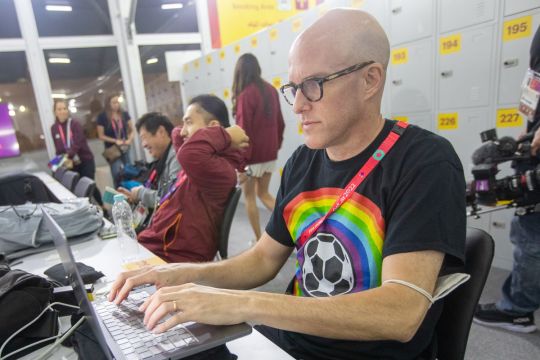
Earlier in the tournament, Wahl attracted attention for attending the game between Wales and the United States wearing a rainbow T-shirt, in support of L.G.B.T.Q. rights. Homosexuality is criminalized in Qatar, and some fans wearing rainbows on their clothing or carrying rainbow flags have been questioned by stadium security guards.
Wahl wrote that security guards at Ahmad bin Ali Stadium detained him for 25 minutes, telling him that his shirt was political and that he needed to take it off. Wahl refused, and eventually a security supervisor apologized and let him into the stadium.
On Wednesday night, he hosted a gathering at his apartment in Qatar to mark his birthday, which Scanlan said was on Thursday.
#Grant Wahl#Football Journalist#obituary#New York Times#sports illustrated#Fox Sports#CBS#World Cup#FIFA World Cup Qatar 2022#football#fußball#fussball#foot#fodbod#futbol#futebol#soccer#calcio
1 note
·
View note
Text
Exploring theory with practica musica jeffrey evans

#Exploring theory with practica musica jeffrey evans professional#
During this period, he studied privately with Dennis Sandole, Charlie Banacos, George Garzone, Bob Moses, Joe Morris, John Thomas, Ben Sher, Jack Pezanelli, and John Wilkins, attended masterclasses and clinics with Mick Goodrick, Dave Liebman, Chuck Loeb, Frank Tibeiri, Charlie Kohlhase, Chad Smith, Laszlo Gardony, Jamey Haddad and Alex Skolnick, and took single lessons with Ran Blake, Ben Monder, Ron Thomas, and Tony Marino. While attending CMS for three years, he studied guitar and music theory with Eric Sessler, Don Reese, and James Kinney.Īfter graduating high school from Perkiomen Valley in 1998, he attended the Berklee College of Music receiving a B.A. Ryan Leaver started his journey in music education at the Community Music School (Trappe, Pa) in 1996 at the age of 16. Drum and Bugle Corps, Lansdowne Symphony, Chester County Concert Band, Turke’s Head Brass, Atlantic Brass Band, North Penn Symphony, Southeastern Pennsylvania Symphony Orchestra, Philadelphia German Brass Band, Tuba 4’s, Ringgold Band, Immaculate Symphony, The Quakertown Band, The All American Brass Band, Upper Darby Sousa Band, Bushwhackers Drum Corps, The VAMM Band and many, many other groups that needed a tuba player. I am returning to the post of Low Brass Instructor with the Community Music School in Trappe which I previously held from 2005 – 2008. I have performed with The Golden Rams Marching Band (West Chester University), Reading Buccaneers Sr. Chuck Neidhardt to play music and share it with the public, because it truly is a gift we can all share in. Mostly, I really love to play the tuba, and it is more fun with many friends. I was one of many local musicians that came together under the very capable leadership of Mr. My name is Randy MacIver and I have been a tuba playing member of the Montgomery County Concert Band in Lansdale Pa. If you ask Rob, he will tell you that he himself is a constant student of the trumpet, and enjoys passing along his findings to students and colleagues alike. Diener likes to use his vast experience to make learning the trumpet a fun, and positive experience for his students. He has also appeared at the Berks Jazz Fest, The Rehobeth Jazz Fest, the Point Pleasant Jazz and Blues Festival, The Central Pennsylvania Friends of Jazz festival, and Bethlehem Musikfest. He has also Played the National tour of the Broadway musical 42nd Street, as well as subbing on the North American tour of The Producers. Rob has performed with such artists as Greg Karukas, Gerald Veasley, Rick Braun, Chuck Loeb, Jeff Kashiwa, Richard Elliot, Joe McBride, The LA Chillharmonic, Brian Bromberg, The Heads Up Superband, and Chieli Minucci and Special EFX. Diener formed his own band Anomaly, which has 2 cds to its credit that were reviewed nationally. He has played in classical ensembles, jazz groups, rock groups, theater productions, and has even performed for major sporting events such as Nascar. Diener has performed all over the country in every genre of music imaginable.
#Exploring theory with practica musica jeffrey evans professional#
Rob has spent the past 20 years as a professional Trumpet player and educator.

0 notes
Text
Meet Anthony Santella, DrPH, MPH, MCHES
By Sara Colabella ’08, MA’11
Senior Manager, Integrated Marketing
Anthony Santella, DrPH, MPH, MCHES, recently joined Fairfield University as professor of Public Health, and Master of Public Health program director at the Marion Peckham Egan School of Nursing & Health Studies. Two months into his new role, he shared about his background in public health, the value of pursuing a career in the field, and his research on improving the health and wellbeing of vulnerable communities.

1. Prior to joining Fairfield, you taught public health for almost 15 years. What drew you to the field?
During my last semester at UCONN as a Biomedical Sciences major, I took elective classes in Community Health and Health Administration. Within a few weeks of being a student in these classes I had my "light bulb" moment and realized what public health is, how it works, why it's so important in keeping society healthy and productive and never looked back. I'm drawn to a field that combines my love of the natural and social sciences, health and medicine, social justice, and service. I wish more people understood public health and its contributions, though. In fact, over the last 200 years life expectancy in the U.S. has more than doubled. While most people think this is due to advances in medicine and technology, the largest gains are due to public health achievements such as vaccinations, motor vehicle safety, safer workplaces, control of infectious diseases, safer and healthier food and water, and much more! If you want to learn more about public health, come chat with me or visit This is Public Health!
2. Please share a little about your background and work prior to joining Fairfield.
I grew up in Norwalk and attended UCONN for my Bachelor's degree in Biomedical Sciences. After college I worked in pharmaceutical marketing and advertising for a year in New York City. I then attended Emory University in Atlanta where I earned a MPH in Health Policy and Management and then moved to New Orleans to attend Tulane University where I earned a Doctor of Public Health degree in Health Systems Management. While in graduate school I worked in a vaccine research clinic recruiting persons to HIV vaccine clinical trials. I then moved back to New York City to work for the NYC Department of Health and Mental Hygiene (the largest local health department in the world!) where I served as Director of HIV Policy, Planning, and Implementation and then Senior Program Planning Consultant. In 2009, I left public health practice for academia and have taught public health and health sciences at Long Island University, the University of Sydney (Australia), Hofstra University, and the University of New Haven. While I have been a faculty member for 15 years, I continue to be active in public health practice through my research and evaluation work and by holding leadership positions at the national (American Public Health Association), state (Connecticut HIV Planning Consortium and Connecticut Viral Hepatitis Elimination Technical Advisory Committee), and local (Fairfield/New Haven Counties HIV Planning Council) levels.
3. Can you tell me about your research on improving the health and wellbeing of vulnerable communities?
My research for the past 20 years has focused on HIV/AIDS, Hepatitis C, sexually transmitted infections, and emerging viruses like COVID-19 and monkeypox. My scholarship has focused on members of the LGBTQ+ community, people living with and at risk for HIV and other STIs, people experiencing homelessness, incarcerated persons, and youth and young adults (including college students). I'm particularly interested in expanding prevention tools among these vulnerable and often historically forgotten populations. I've spent many years working on expanding HIV testing and other chairside screenings to the dental setting. While most people don't think of the dental setting as a venue to seek screenings, my research shows both dental providers (dentists and dental hygienists) and dental patients are generally supportive of adding these services and there is a segment of the population that regularly seek a dental provider but have no primary care provider. I've been fortunate to conduct this work around the world including in Australia, China, Vietnam, India, the UK, and of course, here in the US. Another part of my research agenda seeks to expand pre-exposure prophylaxis (PrEP); the HIV prevention pill. There are many Americans, including providers, who are eligible for these FDA approved medications, however, don't have access or even know it exists. In fact,over a million people in the U.S. could benefit from PrEP , but fewer than 25% of them are taking it. More recently, I've worked on a number of evaluation projects seeking to improve the healthcare experience of people experiencing homelessness through a series of "high risk, high reward" programs in NYC.
4. Why should people pursue a career in public health? What sets Fairfield’s program apart?
Public health is the art and science of keeping communities healthy and free of disease, injury, disability, and death and ensuring everyone has a fair and just opportunity to achieve their full health potential. We use theories, models, and practices from many disciplines including the basic sciences, math/statistics, political science, psychology, sociology, and much more to inform public health practice. The Fairfield MPH program is a fully online 45-credit program designed to accommodate the needs of working health and human service professionals. The courses are interdisciplinary so while some classes will only include MPH students, other courses will include graduate nursing, nutrition, and healthcare administration students. This is important given health professionals work in multidisciplinary teams. Our curriculum is guided by the competencies of the Council on Education in Public Health where we will seek accreditation. Additionally, co-curricular opportunities will be made available to students including volunteer opportunities with local health departments, scholarships to attend public health conferences and virtual professional development seminars.
5. What excites you the most about becoming the program director of the Master of Public Health program at Fairfield’s Egan School? What do you most look forward to in your first year?
I love public health and am excited to join the Egan faculty under the leadership of Dean Kazer and Associate Dean Shea. I also look forward to working with my colleagues across campus, including my colleagues in our BS in Public Health program, to integrate public health into the Fairfield University community and surrounding neighborhoods. I'm eager to welcome our new MPH students and make sure they have a fulfilling and productive graduate school experience. In my first year, I hope to build public health practice partnerships, monitor our curriculum to ensure competencies are being taught and assessed according to best practices, partner with Graduate Admissions and Marketing on recruiting talented students, develop a close working relationship and co-learning environment with our inaugural cohort of students, passionately teach public health classes, contribute to the University's mission through service and administration, and continue to be a leader in public health at the local, state, and national levels.
0 notes
Text
A Lecture on Love

A Lecture on Love
Adventurer Jacques Le Gris x Reader
Word Count: 3.9k
Warnings: NSFW. Smut. Romance. Humor. Professor/Student Roleplaying. Semi-Public Smut. Bad Puns. American Reader.
AO3 Link
Author’s Note: Here is the first of my Valentine’s Day fic exchange fics for my wonderful friend @mrs-gucci! I hope everyone enjoys a new Jacques AU, Professor of Archeology and Adventurer Extraordinaire! Also, consider this a prologue and teaser for a larger collaborative crossover fic to come!


Valentine’s Day falling on a Monday was a travesty. On the most romantic day of the year, the only day specifically set aside for romance and lovers, your man had to leave your bed before the sun could even rise in the pink sky. Your relationship was new, still in its early stages of wine and roses, yet it was filled with the promise of a grand future to come. However, despite your protests and you imploring your lover to stay in your bed and indulge in you, he had chosen to be dutiful and hurry off to work, the bastard.
But it was no matter. You had other ways of keeping yourself occupied for the day.
Word had reached you that the most esteemed professor in the History Department of Oxford University was scheduled to give a special lecture this morning in celebration of the holiday. He was to speak on the history of Valentine’s Day and the way it had been celebrated through the ages in its various forms, from the pagan festival of Lupercalia to the contemporary notions of the holiday.
Dr. Le Gris was just the man to give such a lecture. You had only attended a few Oxford lectures since arriving in England from the States, after learning you had been bequeathed a remarkable estate and the title that accompanied it, busy as you were with the tasks associated with your new inheritance. By no coincidence, every lecture that piqued your interest had been given by your favorite professor.
Not only was he one of the most renown archaeologists in the world, he was notoriously handsome and charming, and also infamously debauched and libidinous. Toppling hordes of women into his bed was as much of a crusade for him as toppling empires had been for Alexander the Great. Naturally, he was the perfect man to give a morning-long lecture on all things related to historical courting and sex practices from the romantic to the ritualistic. The bastard had probably tried most of them out himself under the guise of field work.
Dressing in a curve hugging pencil skirt and a safari-style blouse with a menswear tie, you looked game for any and every sort of adventure when you left your home, hurrying to attend Professor Le Gris’s lecture.
It was an unseasonably warm February morning, even the English fog had lifted during the night to reveal a bright blue sky and beaming sunlight. The weather was ideal for all the happy couples you saw out enjoying their day together while you made your lone way onward toward your destination.
The auditorium hosting Professor Le Gris’s lecture was filled to the brim with a chattering crowd. Every seat was taken, and even the aisles and stairs were packed with observers standing to watch and listen to the impressive man speak. You weren’t surprised to see that the majority of students in attendance were young women, all no doubt hoping to catch the professor’s eye. The scent of perfume wafted so heavily in the air off so many women’s bodies that you could have choked on its florid bouquet.
Of course, you were there for the very same reason.
When the man himself entered the room, the crowd fell silent, with only a susurrus of whispers persisting. Dr. Le Gris carried a worn leather satchel that he deposited on a desk in the front of the auditorium. He was massively large and imposing, impeccably dressed in a linen khaki suit with a crisp white shirt that contrasted sharply with his long ebony hair, falling in waves around his shoulders.
A collective sigh resounded through the room when he flashed a dashing smile in the course of introducing himself to those who did not already know him or attend his classes. Every woman in the room surely thought he smiled for her alone.
“Deditionem amare et invenire beatitudinem,” Professor Le Gris began resonantly speaking Latin with his customary aplomb, surely dampening the undergarments of half the audience. “Surrender to love and find happiness. That is the subject of my heartfelt Valentine’s Day lecture for you all today.”
Speaking of rituals and festivals, Professor Le Gris’s rich booming voice filled the lecture hall. He gestured animatedly, pacing as he spoke to the crowd, a true showman reveling in the attention he effortlessly gleaned. He told of pagan festivals and fertility rituals in early history, primal and animalistic. He spoke passionately on the subject of medieval courtly love and chivalry, of knights pursuing true love as ardently as they pursued the Holy Grail. He regaled the audience with tales of the follies of the Greek gods and goddesses, of Ares and Aphrodite, Hades and Persephone, Zeus and Hera, and the men who worshiped them.
“Just as Aphrodite was worshiped in her day, this still holds true as to how every man should revere the woman he loves, as she is his personal goddess to whom he should affirm his devotion and adoration daily,” Professor Le Gris said by way of concluding his lecture, clapping his large hands together and smiling broadly. “At least, those are my thoughts on women and love.”
The professor’s Valentine’s Day lecture was engrossing, to say the least. You wondered how many other ladies had come to Oxford that morning for the sole purpose of listening to him speak and to take in the sight of him, as you yourself had done. He could easily find himself in bed with most of the audience and student body within the hour, if he so chose.
However, to the dismay of many hopeful women, the professor took his quick leave. No doubt used to being swarmed by gaggles of female students, he hastily departed for his office before he could be cornered and pawed at by lusting hands.
Even the men in attendance were affected, feeling more amorous than usual. This was evidenced by several hopeful young men who detained you as you attempted to exit the auditorium, clumsily flirting with you as though they had a chance in hell. Their ineffective passes at you stalled your departure so that you missed your opportunity to greet the professor after his lecture, damn them.
Professor Le Gris had to know the effect his lecture would have on his female audience members and students in attendance. You wondered if it was calculated, directed at anyone in particular, or if he merely enjoyed causing women to lust over a man they could never have. For indeed, Jacques Le Gris was wholly unattainable these days, having carved his final notch into his bedpost after being taken off the market by an illustrious and fiery beauty who had captivated him effortlessly and completely.
Still, your plan was worth a shot.
*******************************************************************************************
Your heels clicked down the tiled hallway leading to the professor’s office. You nodded politely to the students and faculty you met, hoping no one would question your motives for strolling through the hallways of Oxford University during the lunch hour.
It was only a short walk to your destination. The door to Professor Le Gris’s office was open, inviting you to step inside.
Leaning against the doorway, you rubbed one foot up along the calf of your opposite leg below the hem of your skirt, waiting for the man inside to notice you. His office was bright, the curtains on his large windows open to admit beams of high noon sunlight. Floor to ceiling bookcases lined one side of the room, filled with books and manuscripts collected from the ages. The opposite side of the room was lined with open shelves housing countless artifacts, each one singular and priceless. An enormous walnut desk sat at the far end of the office, littered with papers and cluttered with items that had most recently aroused their owner’s interest.
Professor Le Gris sat behind his desk in a leather wingback chair, his large frame hunched over a haphazard stack of paperwork. His long hair fell down in front of his handsome features as he perused the contents of a yellowed page centuries older than you while he scrawled notes into his leather notebook. He had removed his jacket and draped it over the back of his chair. His white shirt was now unbuttoned several buttons down from his throat, exposing a few beads of sweat collecting in the cleft of his massive chest, and his sleeves were now rolled up his muscled forearms. His impossibly handsome state of undress did little to fight against the uncommonly warm February heat, as he had doubtlessly intended, but its effect on you was to his benefit, regardless.
With a sigh of frustration at not finding what he had hoped for on the page, Jacques leaned back in his chair, rubbing his eyes. Growing impatient, you cleared your throat to get his attention.
“Long day, Professor?” you asked with a lilt as Jacques dropped his hand from his face, grinning at you from his seat.
“Long and hard,” he quipped, quick to toy with your question.
“Sounds right up my alley,” you said as you ran your hand over the curve of your hip under the guise of smoothing your skirt. “Perhaps you need to break for lunch and do something to clear your mind.”
“Aren’t you just full of bright ideas,” he replied smugly, not rising from his chair nor even sitting up straight, as would have been polite to greet a lady such as yourself. “What’s on the menu?”
Pushing away from the doorway, you walked into his office, closing his door behind you. Swaying your hips as you walked toward him, you popped the buttons on your blouse, giving him a bit of a show before you reached his desk.
“What would you do if a pretty young student came to you, asking for some help with a problem?” you asked, trailing a finger along the smooth walnut edge of his desk.
“That depends on the student and the problem,” he replied huskily, letting his eyes roam over your bosom inside your unbuttoned blouse. “I’d have to think long and hard about it, wouldn’t I?”
“And what if that same student, all bright-eyed and bushy-tailed, sashayed up to you and asked the esteemed Dr. Le Gris if he wants to get nice and dirty with her?” you cupped your breasts with your question, giving them a squeeze for his benefit. “Strictly in the archaeological sense, I mean. I hear you archaeologists love to get dirty.”
“I don’t know.” He pursed his lips, openly appraising you as he considered your offer. “I have to be careful not to let a student get me in ruins with the goddess I worship every night.”
“Even if that student needed help with all her tight, moist places that an archaeologist would love to get deep into?” you moaned for effect as you moved your fingers to tease your nipples through your bra. “Doesn’t that sound like a problem you’re well-suited to help me with?”
“Who am I to refuse a damsel in distress?” Spreading his legs further apart in his seat, he ran a large hand over his thigh, drawing your gaze. “But if you’re the student, I’d have to get creative.”
“Creative sounds like just what I need, Professor.” As you spoke, you came to stand in front of Jacques in his chair. Reaching out to him, you ran a manicured nail down his exposed chest until the button at his sternum stopped you. “I have a problem I can’t stop thinking about,” you told him, rubbing your thighs together for emphasis.
“Hmmm, that must be quite a problem to drag you all the way down here to my office over lunch,” Jacques replied as he grabbed your hips, pulling you closer to him. “It sounds like you might need a big solution.”
“My thoughts exactly,” you agreed, sinking slowly to your knees in front of him. Continuing to trail your hand down his hard body, you rubbed his already hardening cock through his linen trousers, looking up at him sultrily through your eyelashes.
“And you need my help with this during my lunch hour, do you?” he asked, smirking at your eagerness, as you unbuckled his belt. “Doesn’t a pretty girl like you have a man to help her solve problems like this?”
“I do, but what can I say? I’ve been in a terrible state all morning without him,” you teased, bringing your face closer to his cock that now strained against his trousers, fully erect and hungry for you. “I’m insatiable, Professor.”
Growling at your words, Jacques grabbed your wrist, stopping you from rubbing his cock, and he stood from his chair. You were now positioned on the floor in front of him where he towered above you, looking down at you sternly, still holding your arm.
“I don’t think so, cherie,” Jacques told you, shaking his head and pulling you back up to your feet by his hold on your wrist. “If my girl comes to me during lunch because I’ve left her unsatisfied, I’m the one who gets down on my knees.”
Before you could react, Jacques ducked down in front of you, hooking his hands behind your knees, and hoisting you up onto his desk, scattering documents and artifacts across the wood. You laughed at his eagerness as he swiped his powerful arm across the surface of his desk, sending papers flying in all directions, before he crashed his lips against yours, silencing your laughter with his rough kiss.
If his kiss was any indication, he was just as desperate for you as you were for him. Licking into your mouth, his hot tongue slid against yours as his lips caressed you. He wasted no time in reaching down to the hem of your skirt, pushing it up your thighs until it was bunched around your hips as he kissed and kissed you.
When he was forced to pull back for breath, he paused to admire the sight of you laid across the remaining papers on his desk. Grinning down at you, he slowly sank to his knees between your legs in front of his desk. Sliding his hands up your thighs, he pulled your panties down to slip them off your legs and shove them inside his pants’ pocket.
“You’re already dripping for me,” he said reverently at the sight of you exposed before him. “I shouldn’t even let you go out in public like this, cherie. I should keep you chained to my bed.”
“Then you’d miss out on having me for lunch, Professor,” you sighed when Jacques cut you off by placing a kiss to your pussy that was every bit as passionate as the kisses with which he had adorned your lips.
“Let me worship at your altar,” he said as he lifted your legs onto his shoulders and clamped his hands down firmly on your hips to hold you in place while he made you writhe in pleasure. Meeting your eyes from his place between your legs, he licked a fat stripe up the center of your pussy.
“You have such a talented tongue, Jacques,” you moaned, twisting a hand into his hair and bucking your hips against his face.
“Jacques?” he paused to grin up at you like the cocky bastard he was. “I thought it was Professor Le Gris today?”
“Correcting me is hardly the best use of your tongue.” Giving his hair a yank with your words, you laughed again when he returned his mouth to you. You could feel him smiling against you before he resumed licking through your folds.
Tracing his tongue down to your entrance, he hummed in pleasure as he licked inside you, his rich tone vibrating straight into your pussy. After savoring you for several long minutes, he swirled his tongue around your clit before sucking it softly between his lips. He continued until your thighs began to quiver where they were clamped on either side of his head, your orgasm imminent.
“Stand up and fuck me,” you ordered, tugging on his hair to get his attention. “I want to cum on that big cock of yours, Professor.”
Happily complying, he withdrew his mouth from you and pushed back up to his feet. Towering above you, he palmed his cock through his pants as he stared down at your beautifully disheveled countenance, before shoving his pants down his legs. His cock bobbed heavily, arching eagerly for you, when he lowered his massive body over yours. Taking his cock in his hand, he ran his thick tip through your folds, smiling at the feeling of your slick arousal.
Your lips parted in rapture at the feeling of Jacques sinking his cock into you, spreading you around the thick length of him. Your moan was loud enough that anyone walking down the hallway outside his office would surely know how Professor Le Gris was spending his lunch hour when his hips came flush to yours. Jacques was no better, throwing his head back and growling in pleasure from the feel of being inside you.
Lowering his body over you to cover you fully, Jacques met your lips again, pouring all of the adoration he harbored for you into his kiss and drawing sighs from your lips as he began pistoning his hips into you.
Jacques fucked you roughly, not restraining himself, knowing you wanted to feel all of his ardor and strength. Feeling the way you dug your nails into the meat of his back told him that he was giving you exactly what you wanted, as he always did.
The desk scooted across the floor with Jacques’s every firm thrust, creaking under the heavy weight of the beast of a man fucking you on its surface, as you bucked your hips beneath him to meet his rhythm. The feeling of being caged below Jacques and being so full of him in every way was always sinfully pleasurable. That marvelous sensation was matched only by the way his powerful muscles felt as they tensed and flexed under your hands with his vigorous movements.
Currents of pleasure began to race through your body, sparking through your limbs with each slam of his cock. Each thrust rubbed along your best places, pushing you deeper and deeper into ecstasy. Jacques’s massive, powerful body was a sight to behold. His chest glistening with sweat in the dappled sunlight; his heavy muscles taught and straining beneath his white shirt; his hair jostling with the motions of ravishing you; his teeth bared in a pleasured snarl as his eyes gleamed, holding yours. Feeling his incredible cock sliding in and out of you was more than enough to push you over the edge.
Bringing his lips to your neck, Jacques bit at your skin as your shared pleasure mounted, sucking marks into you that would remain visible for days to any who looked closely.
“Cum for me, cherie,” he gritted in your ear when he felt your pussy fluttering around his cock, gripping him impossibly tighter.
At the sound of his deep voice and the feel of it thrumming rich and low, you were overtaken by a blinding orgasm, every muscle in your body tightening and seizing, as you moaned Jacques’s name. He fucked you dutifully through every wave and pulse as you quivered around him, before going limp in your afterglow.
Jacques was only moments behind you, the feeling of your pussy spasming around his cock enough to blur his vision with pleasure. Clenching his jaw, he slammed his cock into you as deeply as he could, filling you up with his hot thick cum.
Breath coming short and chest heaving, Jacques panted as he lowered his head to kiss you, his damp hair falling in a dark curtain around both of your faces. He kissed you slowly now, drawing out each of your pleasure, reveling in the feeling of your body. Wrapping your arms around his neck, you pulled Jacques even closer, kissing him deeply until you were as breathless as he was moments before.
“I guess this means you enjoyed my lecture,” Jacques laughed softly, bringing one of his hands up to your face, his thumb caressing your lower lip appreciatively and his fingers resting gently on your cheek.
“What can I say?” You shrugged teasingly beneath him. “The idea of men worshiping goddesses appeals to me.”
“You should appreciate how well studied I am in that art,” he teased you in turn, winking at you playfully. “Both in academic and historical knowledge, and also in field research.”
“So long as I’m the only goddess you’re worshiping these days,” you said with a light smack to his chest.
“I worship only you, cherie,” Jacques assured you with a smile. “And even Aphrodite herself would be envious of your beauty. My lecture today was for you, my beautiful muse.”
“I’m flattered to inspire you so.” You rubbed your hands over his shoulders as you spoke, appreciating the incredible breadth of them.
“Women have inspired men to greatness throughout the ages,” Jacques said as he placed another soft kiss to your lips. “I would happily write sonnets for you and wage war in your name, amour.”
Pushing up from your body, Jacques finally looked around the room. His grin grew into a hearty laugh at the sight of the chaos around you. Scattered papers littered his office, and his desk sat askew from being scooted across the floor.
“I should have listened to all those warnings about you,” Jacques told you with a laugh. “You’re a troublemaker.”
“Warnings about me?” you laughed in return, running your fingers through the thick waves of his hair. “Oh, I think that between the two of us, I’m ignoring far more red flags, Professor.”
“You’re the only goddess I worship,” he promised you. Straightening to his full height, he pulled you up with him, kissing you again before setting about smoothing your clothing back into place. “And the only woman I have ever known who was deserving of that title.”
“Do you intend to stay cooped up in here all day?” you asked, shaking your head in disapproval at the disarray of his office. “Or can we spend a proper Valentine’s Day together?”
“I have a very special surprise for you, in fact. I was going to tell you this evening over dinner, but since you’re so fucking tenacious, I’ll tell you now,” Jacques began, smacking your ass to playfully scold you. “Before you interrupted me, I think I finally figured out where that mysterious artifact of yours originated.”
“Really?” you asked excitedly, just as eager to solve a centuries-old mystery that you and Jacques had pondered for weeks.
“How does a trip to Cairo sound, ma amour?” Jacques knew your answer to his question even before you excitedly jumped into his arms, kissing him deeply as he twirled you off the ground.
Spinning you around and around as he kissed you, he knew that while he may yet lead you to discoveries and riches untold on your upcoming expedition, the greatest treasure he would ever find in his lifetime was already secure inside his arms.
*******************************************************************************************
© safarigirlsp 2022

Tagging some buddies! @babbushka @mrs-gucci @mrs-zimmerman @iamburdened @gabesprincess @reborn-rekall @rynwritesstuff @candycanes19 @caillea @queeniebee @mythrielofsolitude @ghoulian13 @icarusinthesea @darkhairedmenrule @reyloaddict55 @fizzywoohoo @heartlight-starlight @richbrittstein @clydesfavoritegirl @emi11ie @bensolodyad @danidanisara @thepalaceofmelanie @durangoninetyfive @gotham-city-uber-driver

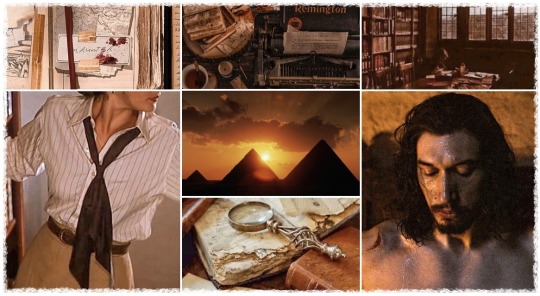

#my stuff!#my writing#adventurer#valentine#summer#jacques le gris x you#jacques le gris x reader#best#fic#the last duel
284 notes
·
View notes
Text
How I Became an Archaeologist
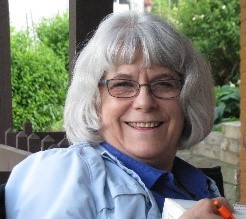
If you had told me when I was 15 that I would spend my life as an archaeologist, I probably would have been pretty surprised. I didn’t grow up knowing a great deal about archaeology or even being fascinated by arrowheads. At that time, I might well have asked what an archaeologist really is and what one actually does. I did get to visit the Parthenon and other ruins while on a trip with my aunt when I was sixteen. Even then, I don’t remember having more than a casual interest in what could be learned from these places. I was more interested in the living people and the new food dishes I encountered on that trip, which was my first trip outside the United States.
From talking to other archaeologists, I’ve learned that there are a lot of paths to deciding archaeology is going to be your life’s work. In my case, what led me to archaeology was anthropology, and specifically an elective course I took in the Fall of my senior year in high school that was taught by a Ph.D. student at the University of Massachusetts. Until then I had not been a serious student, although I did well enough in school. Perhaps I was slightly bored by most of my courses, but anthropology was anything but boring! It looked at people elsewhere in the world and over great periods of time. Many of these people lived different lives than my friends and I did, and they sometimes thought very differently about what was important in life than people here in the United States. I was fascinated, and, honestly, I particularly liked the fact that the conventions of American society, which to my teenage self were sometimes a little confining, weren’t after all the only sensible way to approach life. That year, as I chose a college to attend, I specifically looked for anthropology programs. I chose Beloit College in Wisconsin, which to this day has an excellent anthropology program.
Initially, I thought that I was most interested in cultural anthropology, but like most anthropology departments in the United States, Beloit required its anthropology majors to take courses in biological anthropology, linguistic anthropology, and archaeology as well as cultural anthropology. These are what are known as the four fields of American anthropology and together, they give us a more complete picture of humans in both the past and the present. Most people focus their careers in one subfield or another, though we recognize the importance of each one for understanding humans, and in most cases in North America our degrees are in anthropology not one of the subfields. In college, I found all these courses more fascinating than anything I had studied before, and I actually became a good student as I explored anthropology. I was learning so much neat stuff! I also did volunteer work in the Logan Museum at Beloit, which was founded at the end of the nineteenth century and holds some pretty amazing ethnographic and archaeological collections. It was there I first became interested in artifacts and learned to clean and care for them. After a college internship in cultural anthropology convinced me that cultural anthropology was not the most interesting part of anthropology after all, I began to focus on archaeology. I was most intrigued by my courses in Mesoamerican archaeology and North American archaeology, which before college had been completely unknown to me.
When I graduated from college, I still wasn’t sure what I would do with my life. I worked for about two years both in social work and as a tax auditor for the IRS, but decided in 1974 to try graduate school in archaeology because I still found what archaeology had taught me about past people compelling. I lived in Chicago, so I enrolled in the Ph.D. program in North American archaeology at Northwestern University in Evanston, Illinois.
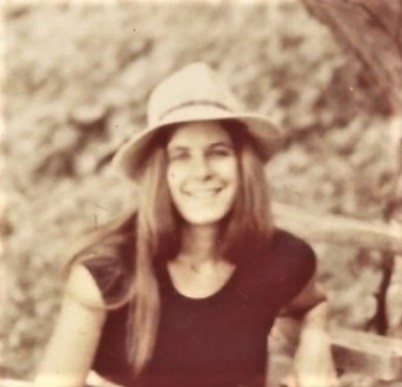
My graduate self in the late 1970s. Photo credit: Phillip Neusius
The biggest shock of graduate school was my professors’ almost immediate insistence that I pick what research I wanted to do. They pushed me to develop an expertise or skill within North American archaeology through my research. It sounds obvious to me now, but I think many beginning graduate students are like I was, lovers of the discipline’s knowledge, but a bit daunted by becoming an independent researcher. Developing an area of focus and specialty skills is part of becoming a professional archaeologist. One reason for this is because contemporary archaeological undertakings rely on teams of researchers, each contributing special skills and knowledge to accomplish the many aspects of excavation, analysis, and interpretation. If you envision archaeology as the solitary pursuit of an elusive artifact or site, you don’t have the picture quite right. Think instead of archaeological fieldwork involving groups of scientists working together to discover and carefully record many different bits of evidence about what the world used to be like and what people did in it. Also think about the many hours these scientists and others will spend not only in the field, but in the laboratory after an excavation is completed cleaning finds, describing artifacts, and analyzing data in order to make meaningful interpretations.
For someone like myself, who loved all aspects of anthropology, not to mention archaeology, and who had only gradually settled on North America as my geographic focus, picking a focus on entering graduate school was a hard task. There was so much that would be interesting to study! However, I did remember especially enjoying a research paper I had done in college on the relatively new interdisciplinary field of zooarchaeology, so under pressure, I told my professors I wanted to pursue this subfield in graduate school. Amazingly, this turned out to be a good choice of specialization for me. I found that I really love to work with collections of animal bone. For me, opening a bag of bone refuse from a site still is exciting. Bone identification work is a little like doing a jigsaw puzzle without all the pieces. It is challenging, and it takes concentration and careful observation to piece together what you can. There is so much to figure out about any single piece of bone! What animal is it? How healthy was the animal? What part of the animal’s body is it? Has it been burned or cut? How was the bone buried and changed after the humans were done with it? Then you have to record this information so it can be combined with other observations on the assemblage of bone you are looking at. After identification, making sense of what a collection of the bones means and correlating these kinds of data with other information from a site and region requires careful analysis, but also insight and creativity. To me it is endlessly fascinating.
Besides finding that I liked the work, choosing zooarchaeology was also serendipitous since my professors were looking for a student to work with them on this aspect of a big project they were undertaking in west-central Illinois centered on the Koster site, which was first inhabited more than 9000 years ago and then reinhabited by people right up into modern times. Most importantly the poorly known Archaic Period levels were numerous, well-preserved, and distinct from each other so we could add a lot of new information through our work. For my dissertation I was able to look at the animal remains from levels of this site dated between approximately 8500 and 6000 years ago, which represent how people used animals at that time.

Koster site strata. All those dark layers are from Archaic period camps at the site. Photo credit: Del Bastian, Center for American Archaeology.
Graduate school was intense, but I continued to be fascinated by archaeology’s ability to tell the story of people lost to standard Western history. In those days I was excited to be part of this science that could do so much more than describe and take care of cool artifacts. It was a heady thing to learn that I could contribute to what was known about people who lived thousands of years ago. In later years, I’ve had to think more critically than I did then about what a privilege it is for an archaeologist to learn about the history and lives of other ethnicities. Today’s archaeologists recognize their responsibility to present information about past people for both scholarly and public use in ways that are sensitive to what is considered sacred and private by the descendants of those people. I think this is an important change in perspective, but in the 1970s most archaeologists just wanted to show that people’s stories from the past could be told using the techniques of archaeology. I certainly was happy, if a little naively so, to have found a way to contribute to telling the human story.
If I consider entering graduate school as the start of my professional career as an archaeologist, I have been pursuing this career for more than 45 years! Over the years I have done zooarchaeological and archaeological work in the American Midwest, Southwest, Southeast, and Northeast working on telling the story of people who lived as long as 9000 years ago and as recently as the Sixteenth century. I’ve worked at several universities, in a small museum, and on small and large archaeological projects in the field of Cultural Resource Management (CRM) doing archaeological survey, site excavation, and zooarchaeological identification and analysis. I’ve written scholarly papers and articles as well as a textbook on North American archaeology. However, beginning in the late 1980s, I spent more than 31 years doing research and teaching anthropology and archaeology here in Pennsylvania at Indiana University of Pennsylvania. In this job I taught both undergraduates and graduate students, but, as is typical of university professors, I also spent time doing fieldwork and analysis as part of my research while at IUP. Fortunately, because archaeology is a team undertaking, I’ve been able to involve many students in my research. Working with students in research as they discover what fascinates them has been a highlight of being an archaeologist for me. I’ve now retired from teaching but not archaeology. I’m still working with both physical and digital archaeological collections both through CMNH and elsewhere and writing about archaeology. Who knows what this career still will bring me!
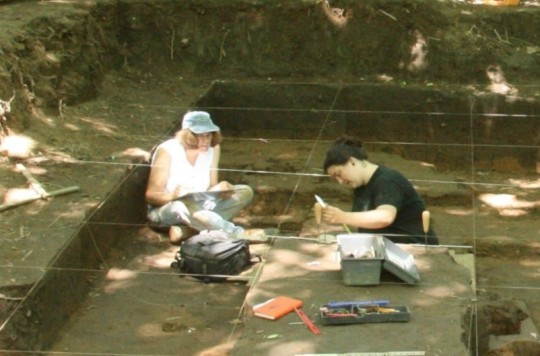
Drawing a profile at the Johnston site with one of my students in 2008. Photo credit: Erica Ausel, IUP Archaeology.
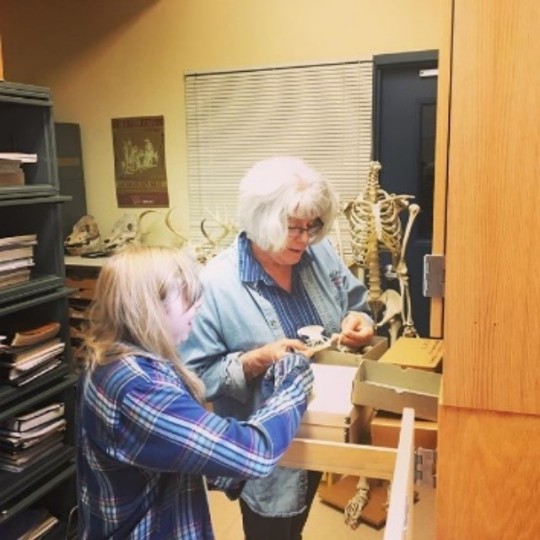
Tracking down a bone identification with one of my students in the Zooarchaeology Lab at IUP. Photo credit: Beverly Chiarulli.
If you are reading this blog because you are thinking about archaeology as either a career or a hobby, I hope you realize that mine is just one story among the many that could be told. Because there are so many aspects of archaeology, people come into it from all sorts of backgrounds and because of all sorts of interests. I think that it is important to remember though that it really is about understanding people and telling their stories through the artifacts and other evidence we find. This is what interested me in archaeology in the first place. Discovering the details of the human story is a giant undertaking. There is no shortage of research problems or work to do, but solving the puzzles presented by sites and collections is both challenging and fun. I’m certainly glad I decided to become an archaeologist and zooarchaeologist so many years ago!
Sarah W. Neusius is a Research Associate in the Section of Anthropology at Carnegie Museum of Natural History and Professor Emeritus, Department of Anthropology, Indiana University of Pennsylvania. Museum employees are encouraged to blog about their unique experiences and knowledge gained from working at the museum.
Definitions of Bolded Terms
anthropology -the study of humans including the physical, cultural and social aspects in the past and present.
cultural anthropology - the study of the cultural aspects of humans especially recent and contemporary social, technological, and ideological behavior observed among living people.
biological anthropology – the study of the biological or physical aspects of humans, including human biological evolution and past and present biological diversity.
linguistic anthropology - the study of the structure , history, and diversity of human languages as well as of the relationship between language and other aspects of culture.
archaeology - the study of past human behavior and culture through the analysis of material remains.
ethnographic – relating to the scientific description of people and cultures especially customs and beliefs.
Mesoamerican archaeology - the archaeology of the area from central Mexico southward through Belize, Guatemala, El Salvador, Honduras, Nicaragua, and northern Costa Rica.
North American archaeology - the archaeology of the area from central Mexico northward throughout the United States and Canada.
zooarchaeology – a subarea of archaeology involves the identification of animal remains from archaeological sites and investigates the ecology and cultural uses of the animals represented.
assemblage - a collection of artifacts from the same archaeological context.
Archaic Period - a time period from approximately 10,000 BP to 3000 BP that is recognized in most of North America.
Cultural Resource Management (CRM) – an applied form of archaeology undertaken in response to laws that require archaeological investigations.
archaeological survey – the systematic process archaeologists use to locate, identify, and record archaeological site distribution on the landscape.
163 notes
·
View notes
Photo
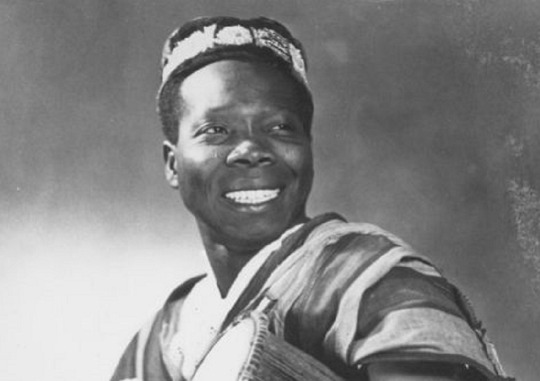
Introducing the West to world music, this Nigerian drummer also fought segregation with MLK, Malcolm X
From a Yoruba family in Lagos State, Nigeria, Babatunde Olatunji, while living in the U.S. after winning a scholarship to study at Morehouse College in Atlanta, wanted to become a diplomat. Thus, after graduating from Morehouse in 1954, he enrolled in the Graduate School of Public Administration and International Relations at New York University.
But two things later moved him towards a career in music. The first was his visit to Ghana as a delegate to the All African People’s Conference organized by Ghanaian president Kwame Nkrumah, who told him he thinks he should be a cultural ambassador. The second was his meeting with Columbia Records producer John Hammond after a concert at New York’s Radio City Music Hall. Hammond would help Olatunji produce his 1959 debut Drums of Passion album which some say may have been the first African music release recorded in a modern U.S. studio.
That album became a major hit, selling millions of copies globally and helping introduce Americans to world music. Olatunji would go on to promote African music, earning a Grammy nomination, being behind compositions for Broadway and Hollywood, as well as appearing on programs including the Tonight Show, the Mike Douglas Show and the Bell Telephone Hour.
In 1964, after performing at the New York World Fair’s African Pavilion, he used the proceeds to open his own Olatunji Center for African Culture in New York’s Harlem neighborhood, where he offered classes in African dance, music, language, folklore, and history. Soon, Olatunji became highly recognized as a pioneer in the fusion of African music and jazz. “…We were playing ‘Afro-jazz’ before anybody called it that,” the recording artiste, who grew up in a fishing village in Nigeria where drumming accompanied every celebration, recalled in an interview.
But while his contribution to music is well known, his commitment to social activism is rarely talked about. “He really deserves to be remembered more for his role as a political activist in the US civil rights movement – before it was even a movement,” Robert Atkinson, who collaborated with Olatunji on his autobiography The Beat of My Drum, was quoted by the BBC in a report.
Indeed, Olatunji’s social activism work started right from his days at Morehouse, where he debunked common myths about Africa.
“They [classmates] had no concept of Africa,” he recalled. “They asked all kinds of questions: ‘Do lions really roam the streets? Do people sleep in trees?’ They even asked me if Africans had tails! They thought Africa was like the Tarzan movies. Ignorance is bliss, but it is a dangerous bliss.
“Africa had given so much to world culture, but they didn’t know it.”
Thus, Olatunji started educating his colleagues about Africa, including its cultural traditions and music. He then went ahead to play African music at university social gatherings while organizing and performing at concerts featuring African and African-American students. These activities were during the height of Jim Crow, and soon, Olatunji was organizing students to challenge the status quo in the south.
Even before Rosa Parks would spark the Montgomery bus boycott, Olatunji was already staging protests on public buses with some of his fellow students.
As president of the Morehouse student body in the 1950s, he was able to meet scores of civil rights leaders, including Martin Luther King Jr and Malcolm X. As a matter of fact, when King delivered his historic I Have a Dream speech in August 1963 during the March on Washington, Olatunji was among the over 200,000 people at the event. The percussionist, social activist and educator performed many times for the NAACP and King’s Southern Christian Leadership Conference.
And at many civil rights rallies, Malcolm X would request him to drum. The man, who is to date described as “the father of African drumming in the U.S.”, was also on the civil rights jazz album We Insist! with playwright Oscar Brown Jr and Max Roach. Back home in Africa, Olatunji was also a part of the anti-colonial resistance movements that had risen across the continent, attending the All African People’s Conference organized by Nkrumah.
The conference, attended by delegates from African countries, prominent African Americans and liberation movements, held discussions on how to achieve continental freedom. Nkrumah had argued that Ghana’s independence would be meaningless if other African states are still colonized by the European powers, and Olatunji couldn’t agree more.
As stated in a report, his involvement in the civil rights movement in the U.S. was largely inspired by the several forms of resistance to colonialism that was occurring in Africa. “He saw himself as a pan-Africanist who always reached out to unify Africans and African Americans,” his wife, Iyafin Ammiebelle Olatunji, told BBC in an interview.
Olatunji in his last years continued to perform while teaching others about African culture and drumming. Before he passed away in 2003 aged 76, he had become known for recordings such as “Celebrate Freedom, Justice and Peace”, “Healing Rhythms, Songs and Chants”, as well as the 1998 Grammy-nominated release, on Chesky Records of “Love Drum Talk”.
#chesky records#olatunji#pan african#african#africans#bbc#african american#malcolm x#max roach#oscar brown jr#nkrumah#iyafin#kemetic dreams#dr martin luther king jr
148 notes
·
View notes
Text
What I think about COVID-19 this morning - Malia Jones, PhD, MPH
What I think about COVID-19 this morning
March 5, 2020
Maybe I'm the closest thing you personally know to an infectious disease epidemiologist. Maybe not--I'm not an expert on this virus by any stretch, but I have general knowledge and training from studying epidemics that is applicable, so here are my thoughts.
First and foremost: we are going to see a tremendous increase in the number of US cases of COVID-19 in the next week. This is not because of some new pattern in the spread of the disease, but rather due to a major change in the requirements to be tested. Until yesterday, if you had flulike illness but had not recently traveled to China, Italy, South Korea, or Iran, you could not be tested. This is just the way healthcare works, you get tested if you meet the case definition and the case definition included travel.
As of yesterday, you can be tested if you are sick and have a doctor's order to be tested. So expect things to feel a lot more panicky all of a sudden. We will see hundreds or thousands of new cases as a result of testing increases.
Second: is that panic legitimate? Sort of. This is not the zombie apocalypse. The death rate of 30 deaths per 1000 cases is probably a wild overestimate. (The denominator is almost certainly wrong because it is confirmed cases--and we only confirm cases when we test for them). That said, even at 3 per 1000 cases, this would be a big deal. A very big deal. By way of comparison, the death rate for influenza is between 1 and 2 in 1000 cases. So, yeah. Roughly 0x to 30x worse than a huge global flu pandemic? That's a problem.
Unlike flu, COVID-19 is not *particularly* dangerous for children, so that’s some happy news. It is dangerous for older adults and those with lung conditions, so we need to be extra careful to protect those populations from exposure.
Also, for millions of Americans, getting any serious illness requiring a hospitalization is a major problem because they can't pay for it. And our health care system is probably going to struggle to keep up with it all. And with China basically closed, our global economy is going to take a huge hit and we'll feel the shockwaves for years. Those are real concerns.
What can we do? Our focus should be on *slowing down the spread* of this disease so that we have time to get caught up. Here is my advice:
1. Wash. Your. Hands. Wash them so much.
The current best guess is that coronavirus is transmitted via close contact and surface contamination. A very small study came out yesterday suggesting that the virus causing COVID-19 is *mostly* transmitted via contact with contaminated surfaces.
I have started washing my hands each time I enter a new building and after being in shared spaces (classrooms especially), in addition to the standard practice of washing after using the bathroom and before eating. Soap and water. Hand sanitizer also kills this virus, as does rubbing alcohol (the main ingredient in hand sanitizer).
There is no need to be obsessive about this. Just wash your hands. A little bit more effort here goes a long way.
2. Don’t pick your nose. Or put your fingers in your mouth, on your lips, or in your eyes. Surface contact works like this: you touch something dirty. Maybe it's an elevator button. Virus sticks to your hands. Then you rub your eye. Then you touch your sandwich, and put the sandwich in your mouth. Now there is virus in your eyes and mouth. See?
You may be thinking, but I don’t pick my nose because I am an adult! An observational study found that people sitting at a desk working touched their eyes, nose, or lips between 3 and 50 times per hour. Perfectly normal grown-ups, not lowlifes like my friends.
2a. There was one note that came out suggesting that face masks actually promote surface contamination because you're always adjusting them--i.e., touching your face. I don’t know if that’s true. But face masks should not be worn by the public right now, unless you are the person who is sick and you're on your way to or actually at the doctor's office. The mask’s function is to prevent spit from flying out of your mouth and landing on things when you cough or sneeze. It flies out of your mouth and is caught in the mask instead. If you are the person who is sick and not on the way to the doctor, go home. Let the people who really need them have the masks. Like doctors.
[ETA on 3/6/2020 honestly people I am getting so much push back on the mask recommendation!! The world is running low on masks. If everyone wants a mask so they can feel ok about keeping their Daytona Beach Spring Break plans and then hospitals in India can't buy them anymore, shame on us.]
Coronavirus does not appear to be airborne in the sense that doesn't remain floating around freely in the air for a long time, like measles does. You are probably not going to breathe it in, unless someone is coughing in front of you. If someone is coughing in your face, feel free to tell them to get their ass home and move 6 feet away from them. (Yeah I know, if you have a toddler, you're screwed.)
3. Sanitize the objects you and lots of other people touch, especially people outside your family--like door handles, shared keyboards at schools (brrr), salad bar tongs, etc. Best guesses are that the virus can live on surfaces for 2-48 hours, maybe even longer, depending on the surface, temperature, and humidity.
Many common household cleaning products will kill this virus. However, white vinegar solution does not. You can make your own inexpensive antimicrobial spray by mixing 1 part household bleach to 99 parts cold tap water. Spray this on surfaces and leave for 10-30 minutes. Note: this is bleach. It will ruin your sofa.
4. "Social distancing." You're going to get so sick of this phrase. This means keeping people apart from one another (preferably 6 feet apart, and sanitizing shared objects). This public health strategy is our next line of defense, and its implementation is what will lead to flights and events cancelled, borders closed, and schools closed.
For now, you could limit face-to-face meetings, especially large ones. Zoom is an excellent videoconferencing option. If you spend time in shared spaces, see #1. Ask your child's school about their hygiene plan, if they haven't already told you what it is. If I were in charge of a school setting, I'd be hand sanitizing the s*** out of the kids' hands, including in and out of each space, and taking temperatures at the door. I am planning to email our school nurse right after this to ask if they need my volunteer help cleaning surfaces.
If you can telecommute, do that a little more. If you are someone's boss and they could do their job remotely, encourage them to do that.
Avoid large gatherings of people if at all possible, especially if they are in an area with cases OR places that lots of people travel to. If you attend group events and start to feel even a little bit sick within 2 to 14 days, you need to self isolate immediately. Like for a tiny tickle in your throat.
5. All your travel plans are about to get screwed up. If you are considering booking flights right now, get refundable tickets. ETA: most trip insurance will not cover cancellations due to a pandemic. Look for "cancel for any reason" trip insurance.
Considerations for risks related to that trip you’re planning: how bad would it be if you got stuck where you are going for 3 to 6 weeks? How bad would it be to be isolated at home for 2-3 weeks upon your return? Do you have direct contact with people who are over 70 and/or have lung conditions? If those seem really bad to you, rethink your trip, especially if it is to a location where there are confirmed cases.
6. If you are sick, stay home. Please! For the love of all that is holy. Stay at home. Your contributions to the world are really just not that important.
7. There is a good chance some communities will see school cancelled and asked to limit non-essential movement. If someone in your family gets sick your family will almost certainly be isolated for 2-3 weeks (asked to stay at home). You could start stocking up with essentials for that scenario, but don't run out and buy a years' worth of toilet paper. Again, not the apocalypse. 2 weeks' worth of essential items. Refill any prescriptions, check your supply of coffee, kitty litter, and jigsaw puzzles.
8. I do want to remind everyone that when public health works, the result is the least newsworthy thing ever: nothing happens. If this all fizzles out and you start feeling like ‘Wah, all that fuss for nothing??’ Then send a thank-you note to your local department of public health for a job well done. Fingers crossed for that outcome.
9. Look, I think there are some positives here. All this handwashing could stop flu season in its tracks! We have an opportunity to reduce our global carbon footprint by telecommuting more, flying less, and understanding where our stuff comes from. We can use this to think about the problems with our healthcare system. We can use this to reflect on our positions of privilege and implicit biases. We can start greeting each other using jazz hands. I'm genuinely excited about those opportunities.
There is a lot we don't yet know about this virus. It didn't even exist 90 days ago. So stay tuned, it is an evolving situation. The WHO website has a decent FAQ. Free to email or text with questions, and you can forward this to others if you think it's useful.
May the force be with you.
Malia Jones, PhD, MPH
I’m an Assistant Scientist in Health Geography at the Applied Population Laboratory at the University of Wisconsin-Madison. I study social contact of humans, and spatial patterns of infectious disease, among other things.
P.S. The number one question I am getting is, did you really write this? Yes. I wrote this.
I didn't write it for professional purposes, so I didn't put my work email on it. It was really just meant to be an email to my friends and family in advance of what I expect to be an escalation in the panic level. But it was apparently welcome information and went viral on FB. I've decided not to edit out the swears, even though I wrote this with a much smaller audience in mind.
Thanks for checking your facts! Go science!
1K notes
·
View notes
Text
Things I Wish I Had Known About Being A Celticist (Before Becoming One):
1. If you’re North American, you’re going to have to work twice as hard to get the same level of respect as your peers from Europe. Get used to that now, because it won’t get any easier as time goes on. You’re also going to very likely be in classes with people who, while not FLUENT in Gaeilge, have at least some background in it. This can be a blessing and a curse - The curse is that you have less of an idea of what’s going on, the blessing is that the professors will focus a lot of the tougher questions on them, at least at first.
2. “So, do you have any Irish family?” You will be asked that question. All the time. If you’re North American or English. Unless you have, say, a grandma from Tipperary, the safest answer is always “No, not at all! I just love the literature/history/language/etc.”
3. Love languages? You’re going to! On average, depending on your program, it’s likely that you’ll at least be learning two languages. At enough of a level where you can get pretty in-depth when it comes to the grammar. Most Old Irish experts are expected to know Old Irish, Middle Welsh (at least enough for comparative purposes), and German, with Latin often being brought in. You’ll also be expected to be able to comment on the development of Old Irish, Middle Irish, Early Modern Irish, and Gaeilge - It’s essential if you’re going to date texts. There are also multiple other Celtic languages (Breton, Manx, Cornish, Scottish) that, while they might not be ESSENTIAL for whatever you’re doing, are still going to be cropping up at different times for comparison purposes - I’d be lying if I said I knew them WELL, and most people tend to stick fairly firmly to their area, BUT you will probably be learning at least a little of them. (Personally, no one asked me, but I honestly think that I couldn’t call myself a Celticist if I just knew one Celtic language, it’s why a longterm goal of mine is to build up as much knowledge of the others as I can.) I’ve seen quite a few scholars go in thinking that the linguistics part won’t be important, only to be slammed by the program early on. Even if you just want to do literary analysis, you’re going to have to explain the meaning and development of individual words, as well as situating it in the broader scope of the development of your language of choice. (IE “This is a ninth century text, and we know that because it has intact deponent verbs, the neuter article’s dying out, and no independent object pronoun. Also everything’s on fire because Vikings.”)
4. You’re very likely going to have to move. This applies mainly for North Americans who want to do it (unless you happen to live directly in, say, Toronto or Boston, in which case ignore what I said and, Bostonians, polish off your GREs and prepare to listen to Legally Blonde the Musical on repeat because you’re going to be applying for Harvard). There are very few Celtic Studies programs in the world and, in general, most of the major programs, sensibly, are in Celtic-speaking countries - So, if you want to study Scottish, you go to Scotland, you want Irish, you go to Ireland, Welsh in Wales, etc. If you already wanted to move to Europe for a year or two while you’re doing your MA, then great (and for EU students this doesn’t apply, since they can relocate much easier...unless they were planning on going to the UK in which case.....my condolences), but if you didn’t have any sudden plans to move, keep it in mind. From an American perspective, it was literally cheaper to move to Ireland and do my MA there than to deal with the school system here, but that doesn’t mean there aren’t other inconveniences associated with moving to another country. Even if you’re European, the field is fickle - An Irish scholar might find themselves moving to Scotland, an English scholar might find themselves moving to Ireland, etc. etc. These things happen when you have to take what you can get.
5. You don’t need Old Irish to go for your MA in Celtic Studies. You do not need Old Irish to go for your MA in Celtic Studies. When I first applied for my MA, I thought I didn’t have a chance because I had a general Humanities degree and didn’t have any formal experience with a Celtic language, least of all Old Irish. As it turns out, most programs do not expect you to have a background in this sort of thing beforehand, and quite a few have different programs for those who have a background in this stuff VS those who don’t, so don’t feel, if this is what you REALLY want to do, like you can’t just because of that. Show your passion for the field in your application, talk a little about the texts you’ve studied, angles you’re interested in, etc., make it the best application you can, and you still have a shot even without Old Irish (or, for non-Irish potential Celticists, whatever your target is.)
6. It’s competitive - Just because you get your MA, PhD programs are fewer and farer between. Academia in general isn’t known for its phenomenal job security, but Celtic Studies in particular is very fragile, since we generally are seen as low priority even among the Humanities programs (which, in general, are the first to be axed anyway.) If you focus on medieval languages as opposed to modern ones, you might very well find your program ranked lower in priority than your colleagues in the modern departments. Especially since COVID has gutted many universities’ income. I found that getting into a MA program was significantly easier than planning on what to do afterwards, since, for a PhD, you generally have to go someplace that can pay you at least some amount of money. Going into your PhD without any departmental funding is a recipe for burnout and bankruptcy, and there are very few Celtic Studies programs that can pay. Doesn’t mean you can’t try, and, when paid PhDs become available, they tend to be quite well publicized on Celtic Studies Twitter/Facebook, but keep in mind that you’ll be in a very competitive market. Networking is key - Your MA is your time to shine and get those treasured letters of rec so that you can get that sweet, sweet institutional funding for your PhD.
7. You’re very likely not actually going to teach Celtic Studies. Because there are so few teaching positions available worldwide, it’s much more likely that you’ll be teaching general Humanities/Composition/etc. This doesn’t mean that you’ll be giving up Celtic Studies (conferences are always going to be open, you don’t have to stay in one department for your entire life and can snag a position when it becomes available, and, even if you go outside of academia, the tourism industry...well, it was looking for Celticists, before The Plague), it just means that if teaching it is what you REALLY want to do with your life, it might be good to check your expectations. A few programs even have an option where you can essentially double major for the sake of job security. (So, if you always wanted to be the world’s first French Revolution historian/Celticist/Gothic Literature triple threat......................the amount of reading you’d have to do would likely drive you insane but................)
8. Make nice with your department. Make nice with your department. Celtic Studies departments tend to be small and concentrated, so you’re going to be knowing everyone quite well by the end of your first grad degree, at least. You don’t have to like everyone in it, but they aren’t just your classmates, they’re your colleagues. You will be seeing at least some of their faces for the rest of your life. I can say that my MA department remembered students who left the program a decade ago. Your department is supposed to have your back, and they can be an invaluable source of support when you need it the most, since they understand the program and what it entails better than anyone else can. You’ll need them for everything from moral support to getting you pdfs of That One Article From A Long Discontinued Journal From The 1970s. I’ve seen students who made an ass of themselves to the department - Their classmates remembered them five years later. Don’t be that guy. Have fun, go to the holiday dinners, get to know people, ask about their work, attend the “voluntary” seminars and lectures, and do not make an ass of yourself. That is how you find yourself jumping from PhD program to PhD program because your old professors “forgot” your letter of rec until the day after the deadline. Also, since your departments are small and concentrated, it’s a good idea to prepare to separate your social media for your personal stuff vs your academics as much as you can, since it won’t be too hard to track you down if people just know that you do Celtic Studies.
9. Some areas of the field are more respected than others. If you want to do work on the legal or ecclesiastical aspects, excellent. If you want to focus on the linguistic elements, excellent. If you’re here for literature.....there’s a place, though you’re going to have to make damned sure to back it up with linguistic and historical evidence. (There’s less theory for theory’s sake, though theoretical approaches are slowly gaining more acceptance.) But if you’re here for mythography or comparative approaches...there is a PLACE for you, but it’s a little dustier than the others. There are fewer programs willing to outright teach mythology, mainly because it’s seen as outdated and unorthodox, especially since the term itself in a Celtic context is controversial. Pursue it, God knows we need the support, but just...be prepared to mute a lot of your academic social media. And, really, your social media in general. And have a defense prepared ahead of time. With citations. Frankly, I think my Bitch Levels have gone up a solid 50% since getting into this area, because consistently seeing the blue checkmarks on Twitter acting like you’re not doing real work while you’re knees deep in a five volume genealogical tract tends to do that to you. If it ever seems like I go overboard with the citations when it comes to talking about the Mythological Cycle, this is why - I have to. It’s how I maintain what legitimacy I have. I’d still do it if I’d have known, but I would have appreciated the heads up. (On the plus side - It means that, in those few programs that DO teach mythology, you’re golden, because they want all the serious students they can get.)
10. If you really, really love it, it’s worth it. After all this, you’re probably wondering why anyone would sign on for this. The work’s grueling and often unrewarding, you might or might not get respect for what you do based off of where you were born and what your interests are, and you’re subject to an incredibly unpredictable job market so you might never see any material compensation for all of it. But, if you can check your expectations of becoming rich off of it, if all you REALLY want to do is chase it as far as it can go, then it’s worth it. There’s a lot of work to be done, so you don’t have to worry too much about trotting over the same thing that a dozen scholars have already done. You might get the chance to be the very first person, for example, to crack into a text that no one’s read for over a thousand years, or you might totally re-analyze something because the last person to look at it did it in the 19th century, or you might get to be the first person to look at an angle for a text or figure that no one’s considered. If finding a reference to your favorite person in a single annal from the 17th century makes you walk on air for the entire day, then you might very well be the sort of person the field needs.
22 notes
·
View notes
Photo
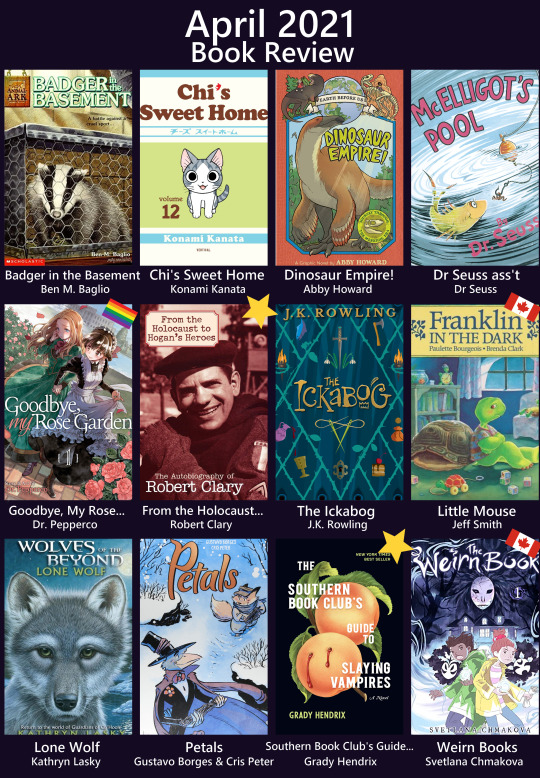
April l was apparently the month for me to revisit some children’s authors who are steeped in controversy at the moment. So here’s my hot (well, lukewarm) takes on issues that absolutely do not need a single other person talking about them. Also some actual good books that I read this month!
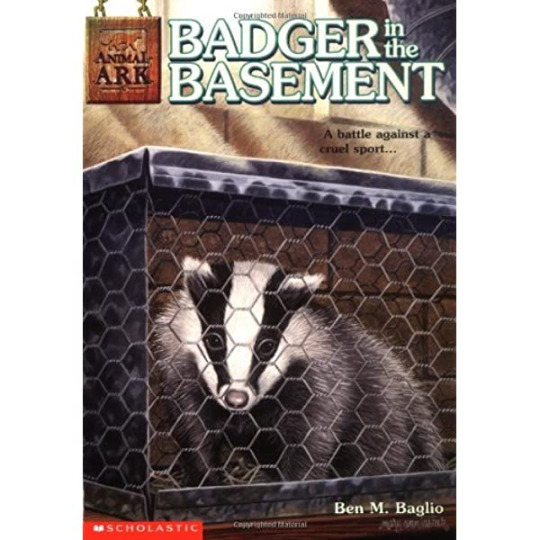
Badger in the Basement
The Animal Ark books are a childhood classic — though I recently found out that apparently there’s a difference between American and British publications, and the American versions didn’t include a lot of actual COOL animals which is… bizarre. As a Canadian stuck in the middle of this, this nonsense drives me nuts. This one was about the main character, the daughter of pair of vets, trying to protect a local badger sett from men wanting to participate in badger digging and baiting. These books are always feel-good, and it was a nice single-day-read while I waited for a library book to come in.

Chi’s Sweet Home
The cutest manga series about the misadventures of a little kitten, Chi, who has been adopted by a loving family. I’ve never bothered to read them in order, but apparently this time I stumbled across the last in the series -- whoops! Still, stood on it’s own pretty easily, and it was a fun read! Things get tense when the family realize that they may have found Chi’s original home… and may have to give up Chi forever.
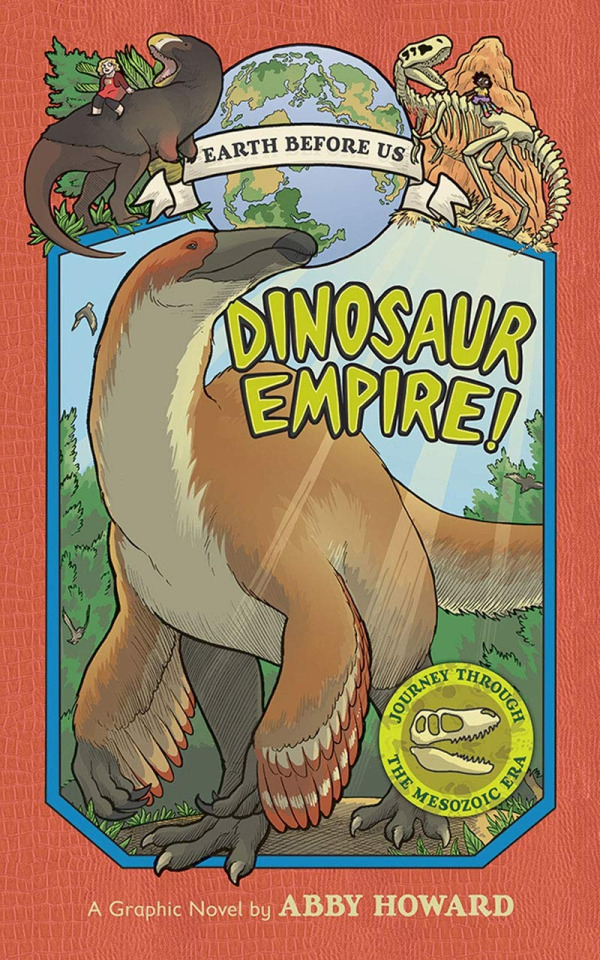
Earth Before Us: Dinosaur Empire!
This was an odd graphic novel, I feel like I’m not sure who the target audience was exactly. It was a nonfiction comic done in a Magic School Bus style, with the purpose of teaching current, up-to-date facts about the animals that lived in the Mesozoic Era. If you’re into dinosaurs, you’ll probably enjoy this! The art is absolutely adorable, I love the dinosaur illustrations, and I learnt some really neat facts. That being said, the pages are really dense, and there’s a lot of info crammed in… some of it will probably go way over a child’s head without specific additional teaching or a very strong personal interest. But that being said, a dinosaur obsessed kid is still probably going to really dig this… as would a dinosaur obsessed adult. It wasn’t my cup of tea exactly but I’m sure it is someone’s.
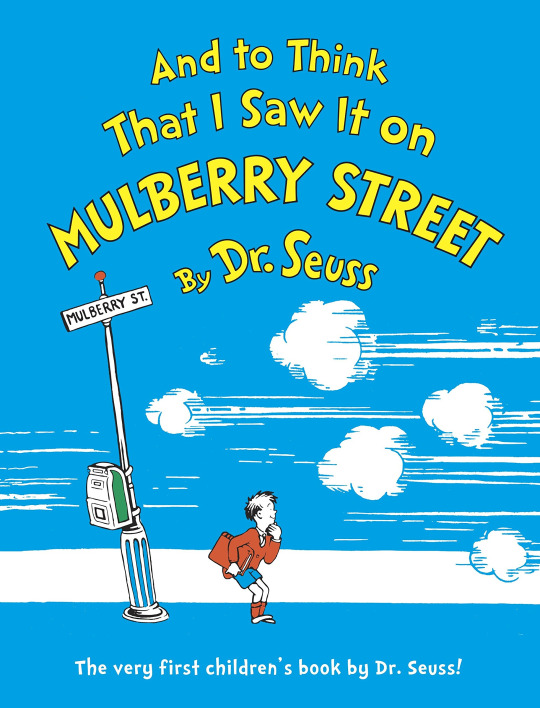
assorted Dr Seuss Books
I love these types of controversies because it means getting to listen to every moron who has never had an opinion on Dr Seuss ever start generating a mile of them out of the aether. So many people are so mad about the six books that are getting retired and I bet most of them haven’t even read them. These are not the friggin Cat In The Hat or The Lorax or even the likes of Yertle The Turtle. I was raised by a grade one teacher, was a voracious reader who loved Dr Seuss, and wrote my university thesis on children’s literature, and I still only knew two of the six books on that list. So by all means, if you want to write an essay explaining why those specific books are worth clinging to, feel free, but if you haven’t even heard of them maybe it’s not a big deal. *grumble*
Anyway, my grousing aside, it gave me the urge to reread a bunch of Seuss books, including the two retiring books I personally knew: McElligot’s Pool and To Think That I Saw It On Mulberry Street. I do still enjoy both, especially McElligot’s Pool which always sparked my imagination, but it’s obvious why they’re being retired and I personally think it’s the right choice. There’s so much good kidlit out there, we can survive without these.
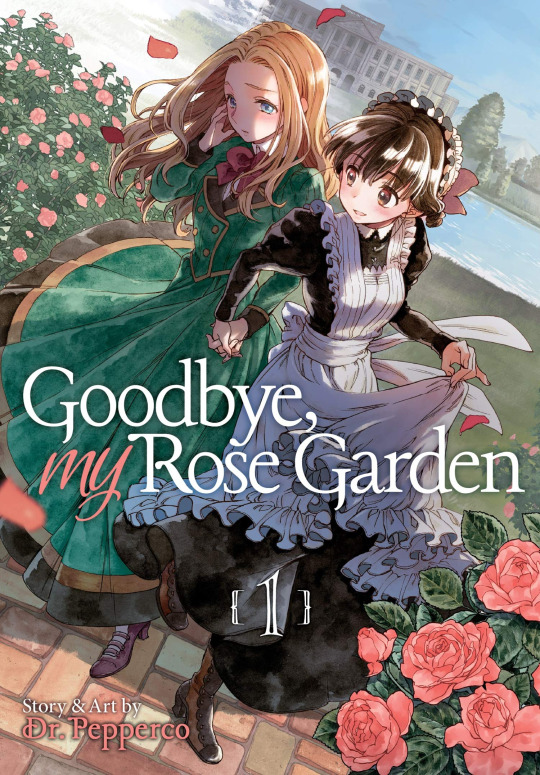
Goodbye, My Rose Garden
A f/f romance manga, fairly standard fair though cute if you’re looking for some historical angst, pretty dresses, and mutual pining. A young Japanese woman moves to England in the hopes of meeting a writer (Mr Frank) who she has long admired. Along the way she is employed by an enigmatic woman with plenty of money, rumours, and melancholy following her. I’ll be honest, uncut romance isn’t really my genre, but I’ll probably still try to the second book to see if the story picks up.
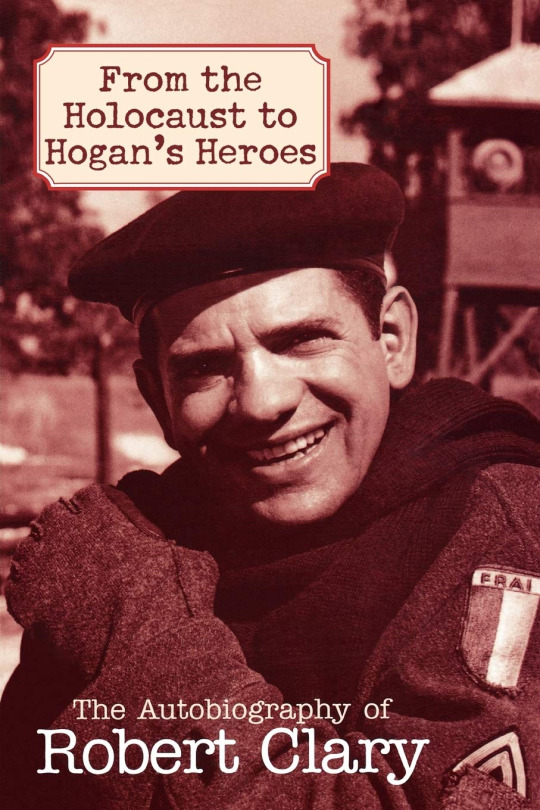
From The Holocaust to Hogan’s Heroes: The Autobiography of Robert Clary
It’s no secret that I’ve been on a Hogan’s Heroes kick. This is the autobiography of Roberty Clary, who plays my favourite character in the show, Louis Lebeau. And holy shit what a life this man has had. He was a Jew growing up in France before the start of the war, and who was one of many children taken away from his family and sent off to the concentration camps in Germany. This was an amazing, intense, inspiring, and heartbreaking read… it has Clary’s voice all over it, and it tells everything from the charming childhood he had, to the horrors of the concentration camps, the brutality of survival, and then about his exciting journey into the entertainment industry afterwards. It’s an experience, would recommend if you’re a fan of the show.
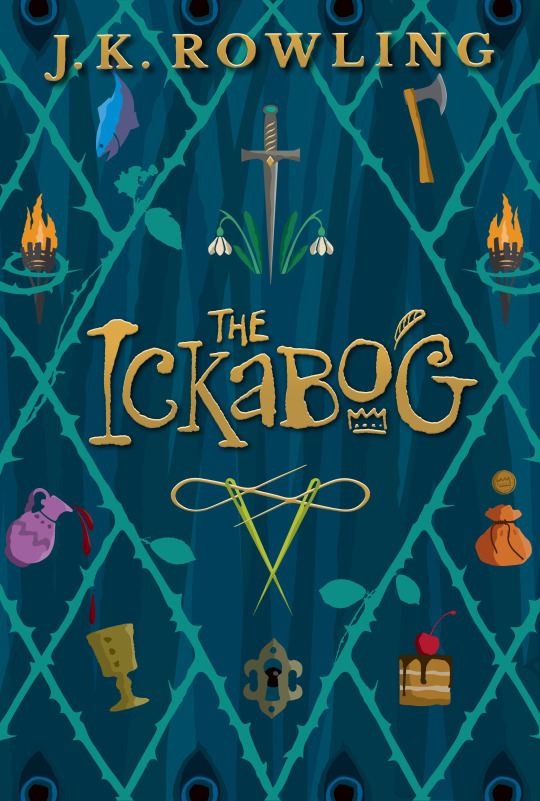
The Ickabog
The second controversial author I read this month. Originally I was going to give Rowling’s new book a miss, given everything that’s been going on over the past few years, but in the end my curiosity got the better of me. Politics aside, it was a fun read! Not groundbreaking, but enjoyable enough and written in an interesting style. It didn’t read the same as a lot of modern kidlit, it felt more like a cross between a classic fairytale and a Dahl book. Perhaps a bit like Despereaux. It tells the tale of how an idyllic country gradually falls into ruin through the ignorance, inaction, and greed, and how a supposedly fictional monster hides the very real, human monsters at the heart of the country. It was cute and pleasant and I’m glad I decided to get it from the library, though for anyone who is choosing not to engage for political reasons: you aren’t missing anything major.
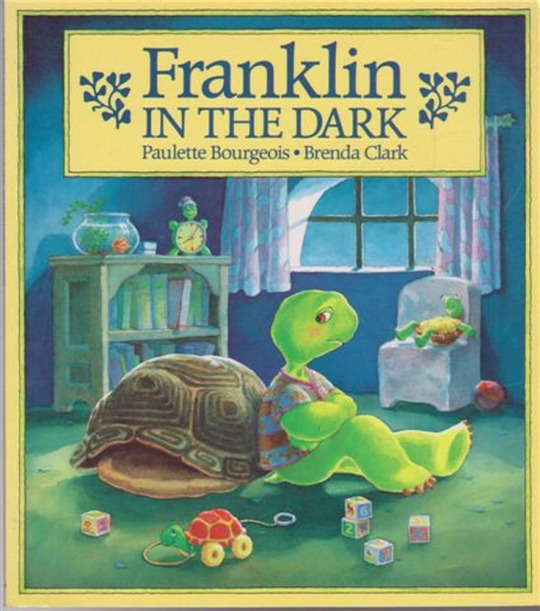
Franklin In The Dark
A Canadian classic. I don’t think there’s a single person my age who hasn’t read or been read a pile of these books, and the nostalgia is so comforting. I found this on Youtube and listened to someone read it to me, and honestly 10/10 would recommend for a calm evening.
The big reason I decided to seek this one out though, was because I finally got to the M*A*S*H episode that inspired this entire series! In the episode C*A*V*E, in which Hawkeye is freaking out over his claustrophia while the camp is forced to take shelter in a nearby cave during some intense shelling, he mentions that if he had been born a turtle he would have been afraid of his own shell, and that the other turtles would make fun of him cause he’d be forced to walk around in his underwear. And so this first story about a young turtle who’s afraid to sleep in his own shell and drags it around behind him. So if you were ever curious, Franklin the Turtle is in fact named after Dr Benjamin Franklin Pierce. (this is also why the French version is named Benjamin!)
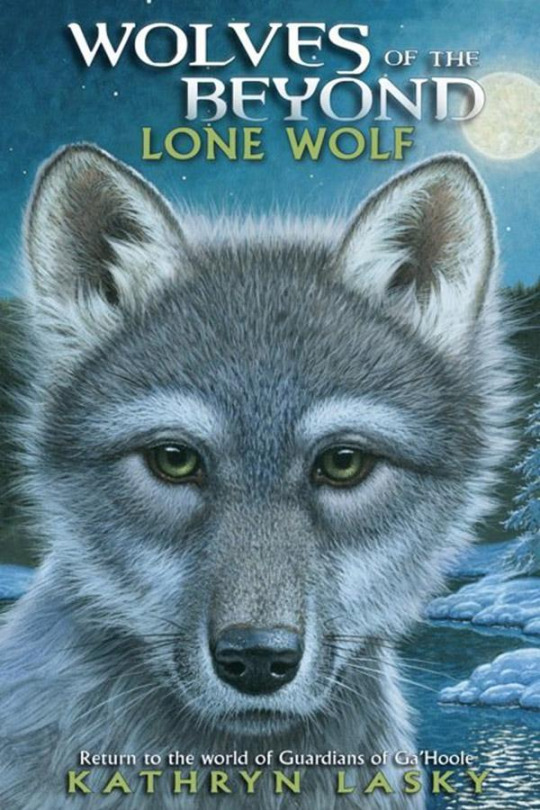
Wolves of the Beyond: Lone Wolf
I loved the Guardians of Ga’Hoole books as a kid but I never read the Wolves of the Beyond series. This first book was an interesting read, Lasky does a great job creating worlds and societies for the animals that inhabit them. Lone Wolf is about a deformed wolf cub who was abandoned in the wilderness to die. And he would have, if a desperate mother bear, who had recently had her only cub killed, hadn’t stumbled across him and saved him, vowing to raise him as her own...
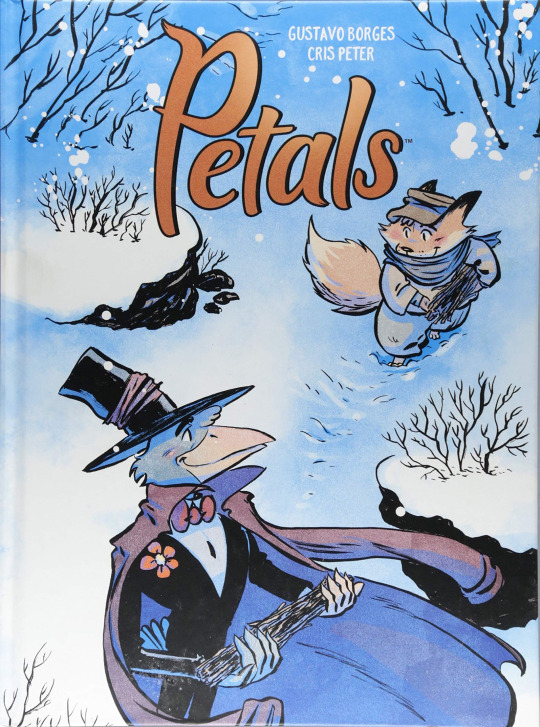
Petals
A “silent” graphic novel. It has beautiful artwork and is told entirely through pictures, no text at all. It’s loves and heart-wrenching, though it left me feeling somewhat unsatisfied… I felt like there should have been more. Still, a neat story.
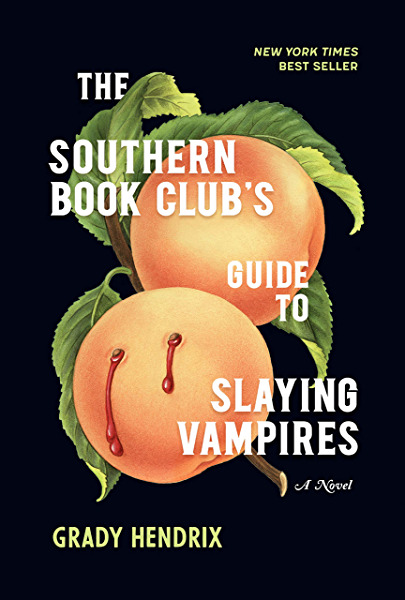
The Southern Book Club‘s Guide To Slaying Vampires
What a banger of a novel!! I can’t recommend this one enough. It’s about a group of suburban mothers in the ‘80s who form a book club out of a shared need for community and a love of grisly true crime novels. But when a strange drifter appears in town and starts setting down roots… and when children begin disappearing… these women need to band together to confront the horrors that have invaded their neighbourhood, and face down not only a terrifying monster among them but the patriarchal system that allows it to flourish. To quote the preface:
“Because vampires are the original serial killers, stripped of everything that makes us human — they have no friends, no family, no roots, no children. All they have is hunger. They eat and eat but they’re never full. With this book, I wanted to pit a man freed from all responsibilities but his appetites against women whose lives are shaped by their endless responsibilities. I wanted to pit Dracula against my mom. As you’ll see, it’s not a fair fight.“
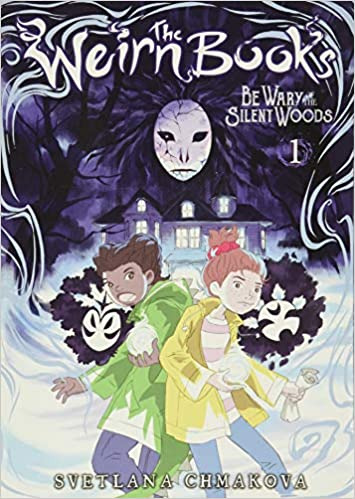
The Weirn Books: Be Wary of the Silent Woods
I love Chmakova’s graphic novels, though I’ve only ever read her slice-of-life middle grade series before. This one is pure fantasy and very fun. It’s about two cousin “weirns” — witches with demon familiars — who attend the local night school. Things get strange though when an ominous figure appears outside the old, abandoned school house deep in the Silent Woods, and begins tempting children down its path…
I’m very much looking forward to word of a second book and was honestly kind of surprised that I haven’t heard more about this book given how popular her other series is. This has all the same charm and quirks but for those of us who prefer stories based in fantasy rather than reality.
And A Bonus...
For some masochistic reason I got a Garfield book out of the library. Jeez, if I didn’t love these as a kid, I found them absolutely laugh out loud hilarious, and now I just don’t see it anymore. But here I will share the one strip in the book that actually made me laugh

#book review#book reviews#chatter#dr seuss#hogan's heroes#robert clary#the southern book club's guide to slaying vampires#animal ark#dinosaur empire#the weirn books#svetlana chmakova#canadian literature#canlit#kidlit#children's literature#wolves of the beyond#mash#franklin the turtle#chi's sweet home#manga#goodbye my rose garden#kathryn lasky#the ickabog#jk rowling
37 notes
·
View notes